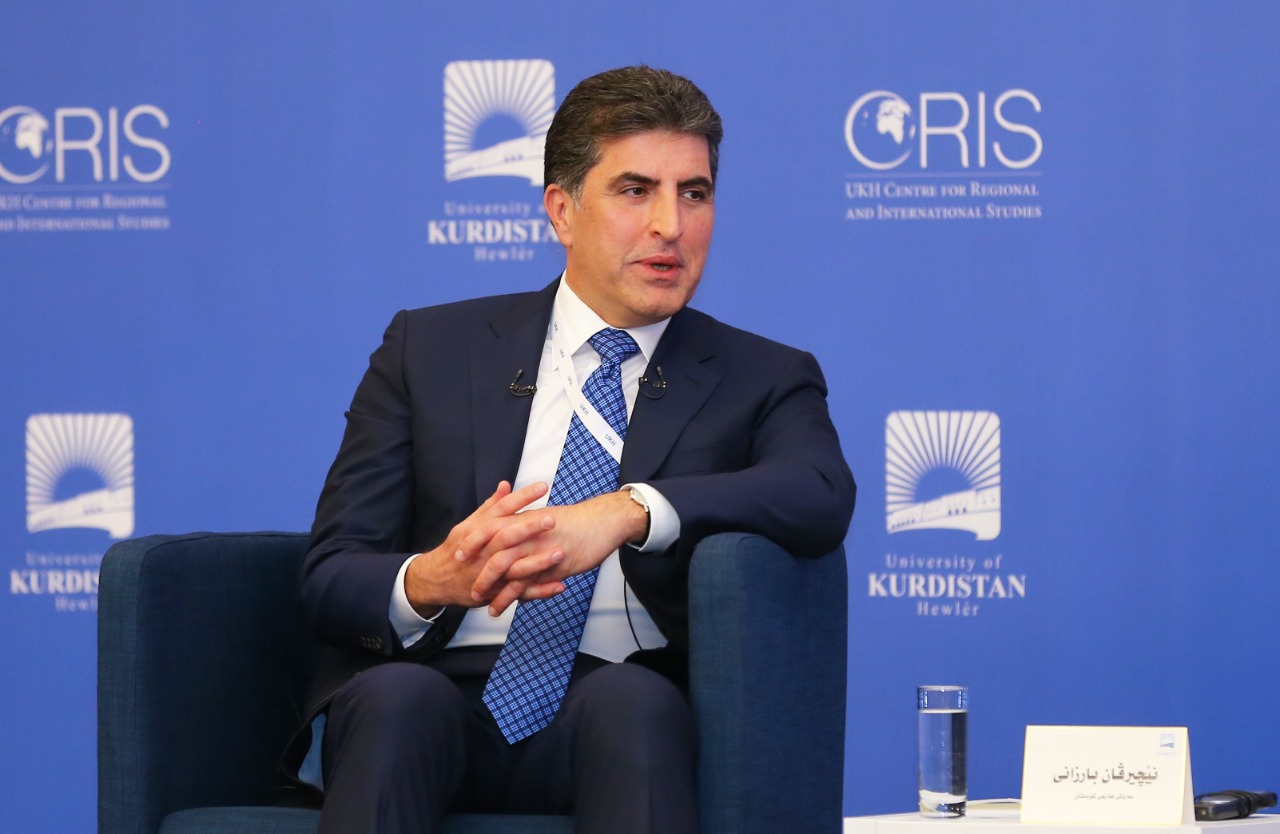
2021-05-20T13:39:09.000000Z
Erbil, Kurdistan Region, May 19, 2021
Kurdistan Region President Nechirvan Barzani attended “The Kurdistan Region of Iraq - Unity and Constitution” conference in Erbil on Wednesday and took part in the last panel discussion of the conference. Below is readout of the President’s address and answers.
At the outset, when answering a question about his opinion about the point of views that were expressed at the conference with regards to the constitution and unity, President Nechirvan Barzani stated: “I would like, in advance, to thank all the honorable attendees who enriched this conference with their comments and opinions. My thanks to the Special Representative of the United Nations Secretary-General in Iraq, whose participation in this conference and her long stay with us, since the morning, was a milestone, indicating her support for the political process in the Kurdistan Region and in Iraq. Thank you very much.”
Continuing his answers, the President stated: “There is no doubt that there was a lot of discussions and opinions about the issue of unity and the constitution (at the conference), and some of which I really agree with and I wanted to express them myself, and which were also expressed by the Prime Minister, Mr. Masrour Barzani, and the Speaker of the Kurdistan Parliament, Ms. Rewaz Fayeq. What I want to say about the issue of the constitution is that the constitution is a means to achieve a goal, so what is our goal in drafting the constitution? What is the objective we want to achieve? What do we want to do when writing it? We want the constitution to organize the political system in the Kurdistan Region, we want the constitution to be the rule of law in this country, we want the constitution so that all components of the Kurdistan Region feel safe in this country, and feel that they and next generations have a better future. The aim of writing the constitution is to protect and strengthen citizenship, which is the most important goal of writing the constitution. We have great diversity in Iraq in general, and we have diversity in the Kurdistan Region. These communities are in the Kurdistan Region, and we do not call them minorities, because the beauty of Kurdistan lies in this mosaic of coexistence and we all live together in this country. Here I remind you of a quote by the US President in 2014 when ISIS began to rampage towards the Kurdistan Region. In the context of his expression of support for the Kurdistan Region, he said, “There is coexistence (in Kurdistan Region),” So, the thing that we should always be proud of is that coexistence exists in this country, and the beauty of Kurdistan is reflected in all the nationalities that live in the Kurdistan Region. In that we are all Kurdistani. There is no doubt that this constitution should provide guarantees for these communities, and the conversations that took place today, especially those in the dialogue that preceded our panel, are the words of the nationalities living in Kurdistan, which have shown that they are not yet reassured. The constitution of the Kurdistan Region should provide guarantees for these communities. The constitution of the Kurdistan Region, and as Mrs. Rewaz Faiq indicated, they gratefully started working on it in the Kurdistan Parliament, and then they discussed it with us as well. It has now become clear that we need more discussions on this issue with the political parties and civil society, because the constitution, as His Excellency the Prime Minister mentioned this morning, and I want to emphasize what he said, is not specific to a single party, nor is it for a specific nationality, or a specific community, but rather the constitution is for all the people who live in the Kurdistan Region, and for this it must be a reflection of the orientations of all components that live in the Kurdistan Region. This is important. We, in the Kurdistan Region Presidency, in cooperation with the Kurdistan Parliament and the Kurdistan Regional Government, will begin to take practical steps to write the constitution. We have met with some parties, but our journey is not over. We will visit the other parties, and we will stand on this issue very seriously. We want it to be a constitution for the Kurdistan Region to which all components of the Kurdistan Region are reassured and place hopes on."
Regarding the issue of unity, the President of the Kurdistan Region stated that “unity is a very, very important issue throughout our history and during the periods in which we have been united. There is no doubt that we as parties are very different from each other, but we have to agree on one thing, on a unifying identity for us, on something that unites us all. For example, during the ISIS war, the Peshmerga represented the identity that brought all the people together, and it was a great honor. In that war, no one said that this is from the Patriotic Union of Kurdistan, or that is from the Kurdistan Democratic Party, or the other is from the Change Movement, or this is Christian or that is Yazidi. Rather, Peshmerga belonged to all and everyone. An identity for us to agree on. The constitution may be one of the chapters and matters that show us what our duties are and what our rights are. If everyone knew this, we could develop the concept of citizenship in this country more effectively. There is the issue of the principles that have preserved the Kurdistan Region until now, and let us look at these stages: since 1991 when the Kurdistan Front was formed and all forces participated in it, we were able to achieve great gains, because we were together. In the other periods that followed, we were together when writing Iraq's constitution, and we were together to a large extent in the ISIS war, and in the recent period when some events happened in Iraq's parliament, we were together and we were able to achieve some gains. But the question is: Has the mission of our unity ended, or should we strengthen it further? We must know the fact that what has been affirmed for the Kurdistan Region in Iraq's constitution is a very important historical document. The only historical document in our hands after 1970, is Iraq's constitution that was written after 2003. But let us ask ourselves a question: Has Baghdad been implementing the Iraqi constitution and the constitutional rights of the Kurdistan Region since 2003? No, they have never done this in all respects. We were in this situation in 2003, and nothing has changed after the fall of the previous regime. But if we ask all the Kurds and say: Are you assured of your future in this country? I think everyone will say with one voice: No! Unfortunately, most of the constitutional articles related to the Kurdistan Region have not yet been implemented. How do you apply these? How is this constitution implemented? The first condition for its implementation and our endeavor to implement it is to be together. With this fragmentation, we will not be able to help ourselves or Iraq. There are many challenges facing the Kurdistan Region today. We have agreed on the budget, the Prime Minister is here, as well as the Deputy Prime Minister, and nothing has been implemented from the budget agreement until now. Iraq has not yet met the Kurdistan Region with any of the matters that have become laws. Our duty is to be together and to be united, so much is ahead of us to achieve in Baghdad through this unity. We believe in the federal system, and we believe in solving our problems within the framework of Iraq and according to the Iraqi constitution, we want to implement the constitutional articles that have a relationship with the Kurdistan Region. The Iraqi constitution guarantees the Kurdistan Region the right to have its own constitution, and the constitution that the Kurdistan Region will have must ensure the continued protection of the values that the Kurdistan Region has always maintained, and are represented in democracy and freedom of expression, which are the principles that distinguished the Kurdistan Region from the rest of Iraq. Here comes the question: Have there really been no gains as was said (earlier at the conference)? We have made very big gains thanks to the allegiance of the people of Kurdistan, the struggle of the Peshmerga, the blood of our martyrs and their efforts, and what we had was not little. But is everything in this country all right and are we not suffering from any problems? No, there are a lot of problems, but the important thing is that besides the existing problems in the Kurdistan Region, we are seeing progress in some areas. The issue of the economy is a big problem in this country, and the financial problem is a big problem, but nevertheless we find that the Kurdistan Region has made great progress in a lot of the stages, this was achieved as a result of the unity. This is not the source of pride for a party alone, but it is a source of pride for all the people of Kurdistan. And if it were not for the support and allegiance of the people of Kurdistan and the understanding of the Kurdistan Region’s employees, it would have been impossible for the Kurdistan Regional Government to continue until now. There is no burden in the world for a prime minister and deputy prime minister heavier than being unable to secure full salaries to civil servants. We should know that the task of the Kurdistan Regional Government is difficult. It is true that there were problems in the past and there are problems now, but in fact we have made good progress. Good progress has been made in matters of transparency, oil, oil auditing and the budget, and let us not underestimate these matters. All parties participating in the government must realize their duty, and feel that they are apart of the political process and decision-making in this government, and in this way we can work together. We must overcome this difficult stage before us. We will write this constitution, but it must be a constitution agreed upon by all parties. We must protect this unity of ranks and continue our efforts until we achieve the gains that are included in the Iraqi constitution. Ahead of us is a very sensitive stage, before us the issue of the Iraqi elections, it is an important stage and all parties are busy reorganizing their ranks in preparation for these elections, and we are in the Kurdistan Region, if we are divided and go all the way, we will not be able to achieve any gains for the Kurdistan Region and for its people, but if we all come together, there is no doubt that we will be able to overcome this difficult stage, God willing.”
On the political stability and efforts of the President within the Kurdistan Region and Iraq and the continuation of his efforts and their results, President of the Kurdistan Region said: “There is no doubt that our efforts will continue, whether within the Kurdistan Region, in Baghdad, or with the outside world. There is great political support abroad for Iraq and the Kurdistan Region, and we must invest in this political support in order to be able to solve our problems with Baghdad within the framework of Iraq and in accordance with the Iraqi constitution.”
With regards to external political support and the speech delivered by Ms. Jeanine Hennis- Plasschaert, the Special Representative of the Secretary-General of the United Nations in Iraq, and the impact of all this on the steps taken by the President in the Kurdistan Region and Iraq, President Nechirvan Barzani said: “The mission of the United Nations in Iraq are known and announced, Ms. Plasschaert supervises the UNAMI office in Iraq, and the mission of this office is to help the Iraqis solve their problems. Thankfully, they had a positive role so far and made serious efforts to solve problems among the Iraqis themselves by all means. In a message to the United Nations, we asked, on behalf of the Kurdistan Region, to further empower the role of UNAMI in helping to solve the existing problems between the Kurdistan Region and Baghdad, and what we aim to obtain as a result is to achieve political stability in the country. Without solving the existing problems, political stability will not be established in Iraq. We find ISIS more active than before in the areas known as Article 140 areas, and it constantly seeks to sabotage stability and security in these areas, and if we want political stability to be achieved in Iraq, these problems must be solved. The Kurdistan Region, with all its components, is not yet assured of its future. We need guarantees, and in this context Baghdad and the international community must help Iraq in general with much more dedication. We do not intend to provide assistance to the Kurdistan Region alone, but rather to help all of Iraq. The problems of the Kurdistan Region are part of the existing problems in Iraq, and solving these problems is of great importance, especially since the United Nations can play a greater role in this field, and in fact we extend our great thanks for their role and the efforts they have made so far.”
Following this, the attendees participated in the conference, by posing a set of questions and observations, and in answering the question of whether the shared objectives outnumber the differences among the parties of the Kurdistan Region, President Nechirvan Barzani said: “Yes, in the Kurdistan Region, the values in common are much greater than the disagreements among us. I am optimistic that we can solve the points of differences. There is no doubt that the differences among parties will remain in this country, and this is part of the situation in the Kurdistan Region. Let me point out another matter, in the past when problems arose in this country, there was a fear of resorting to arms to solve problems and the risk of the outbreak of civil wars, but today we have problems already, and no one thinks about carrying weapons against one another. It is true that we still have many stages to go through, but I see progress on this point, as there is political dialogue and continuity among us, we are not in perfect harmony, but nevertheless no party in the Kurdistan Region thinks about resorting to arms to solve a problem, and I think this is a great progress in the Kurdistan Region.”
Commenting on the question of Mr. Rahman Gharib, Head of Metro Center on the content of the constitution of the Kurdistan Region, President Nechirvan Barzani stated: “I agree with what Mr. Rahman Gharib said regarding the constitution. The Kurdistan Regional Government, Parliament and the Presidency of the Region are committed to these principles (freedoms, democracy, human rights, freedom of expression and information). Mr. Rahman indicated that, and there is no doubt that we are all aware that these are the concepts that preserved the Kurdistan Region. We fought for freedom, the people of Kurdistan fought for freedom, and the first slogans of the revolution were autonomy and democracy. There is no doubt that democracy is not a thing or a gift that a country gives you and says here is democracy, but rather, democracy is a process. I do not claim that democracy in the Kurdistan Region is flawless. There is no doubt that there are shortcomings, but what matters is that we continue the democratic process slowly. We cannot compare the democracy of the Kurdistan Region with the democracy of Western countries, they are different. But the important question is: Are we on the right path that leads to this goal? This is what is important, provided that we continue in this, this country and this people who fought for freedom and democracy will not retreat back. On the contrary, we support these views. But if the question is: Is the Kurdistan Region free from problems and all matters in this respect are complete? I say no, there are problems, and we have to solve them bit by bit, and there is a process, and this process must continue to move towards the goal that the people pursued and fought for in their pursuit of freedom, democracy and sovereignty. So we agree with what Mr. Rahman said. ”
Regarding the question of another participant in the conference, about the concerns of the communities and the addressing of those concerns in the constitution of the Kurdistan Region, the President said: “A constitution must be written for the current reality of the Kurdistan Region. The constitution that we write must embody the reality of the Kurdistan Region with all its components. During this conference and since its beginning this morning, we realized the concerns and anxieties of all parties, including the advocates of secularism, advocates of Islam, and advocates of other communities and religions. We believe that communities can protect themselves and have the right to manage their affairs by themselves, and we have no problem with this, and we had a very successful experience in this field when we sent the Peshmerga and Asayish to the Nineveh Plain after the year 2003. The components in those areas were helped to have their own forces and took charge of protecting their areas by themselves, and in fact they protected their areas from everything until the emergence of ISIS. Unfortunately, as indicated by Cardinal Sako, the concerns are serious, these communities are under great pressure in that region, and these threats should not be underestimated. We are always proud of the fact that the Kurdistan Region is a place of coexistence, and the visit of His Holiness the Pope to the Kurdistan Region and Iraq was a reflection of this. His Holiness the Pope himself made the decision to visit Iraq and visit the Kurdistan Region in Iraq, and his message was the message of coexistence and the values that we as Kurdistanis, government and parliament are always proud of. We will continue to adhere to these values. This constitution has been written and there is a draft for it, but what is written is the mechanism of the constitution, and there are those who think that parliament is the one who writes the constitution. No, the mechanism is clear, which is that the Parliament has to supervise this task. Parliament must form a committee for this purpose, and it is not required that the committee be only those in Parliament. Diverse experts and members should participate in drafting the constitution. We have a draft constitution and it contains a lot of good things and good things have been reached, and they need to be reviewed to be voted on, God willing.”
In response to a question about the fact that each party in the Kurdistan Region wants to write the constitution according to its own standards, President Nechirvan Barzani stated: “A good conversation took place in the first dialogue seminar here, and there was positive talk and some good opinions in the conference. I think this is natural and what is important is that we can respond to these matters. In fact, I do not find a big problem in writing the constitution, the most important thing is that the constitution that will be written reflects the aspirations and demands of all components of the people of the Kurdistan Region, and I think that this is the most important thing, and as I said, the constitution is not written for a party, but for the Kurdistan Region, and we want it to organize matters. The constitution may be amended after years, but we need to write this constitution for the existing needs of the Kurdistan Region and to organize matters. The process of governing and managing is a process that continues for years and takes time. If we look at the Kurdistan Regional Government, we will see that we held elections from 1992 to 2003, and Parliament was established through ballot boxes, and today is the anniversary of the first elections in the Kurdistan Region. This means that it was decided since that time that the Kurdistan Region will solve its problems through the ballot boxes, and the process has lasted from 1992 to now, and will continue. The issue of the Autonomous Administration was the beginning of the Kurdistan Region, and I remember well that all of them in Baghdad were sure in 1991 on one point that the Kurdistan Region would not be able to manage its affairs by itself, they would return and accept our hands and invite us to return to Kurdistan to rule it. Since then and until now the Kurdistan Regional Government was formed and government cabinets established, there were problems and there was progress and there were deficiencies and democracy was not what it should be. But it continued and things did not go for the worse and it should not go in this direction and we must improve it in all respects and move it towards the best. The previous government cabinet and its predecessors in the Kurdistan Region accomplished good things, but also committed mistakes, and this is how the current cabinet will also continue. But it will continue after this as well, and what remains is this people, and this country is the one that will remain, and the generation that comes after us must strive hard to protect the gains that the people fought for. If you ask any of the honorable attendees sitting here, you will find for each one of them a story of suffering and calamities, and I mean that we are all responsible for the current situation of the Kurdistan Region, and none of us is an exception.”
In conclusion, President Nechirvan Barzani stated: “My special thanks to Kurdistan - Hawler University and its president for organizing this conference, and I believe that it was a good conference, which was enriched with the opinions presented during the dialogues. May God assist us all. Thank you very much.”
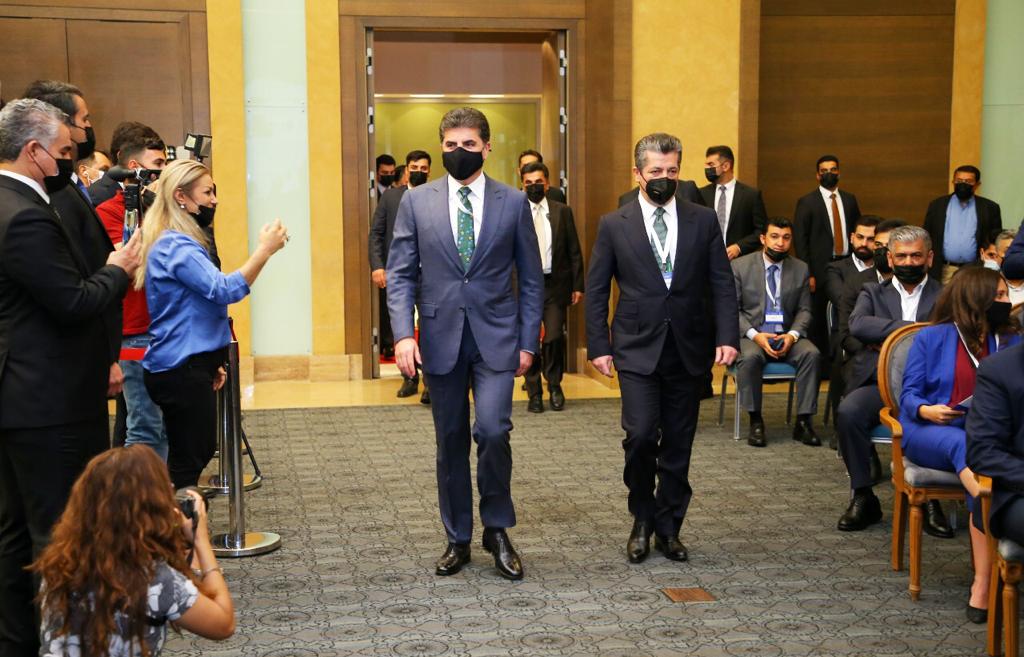
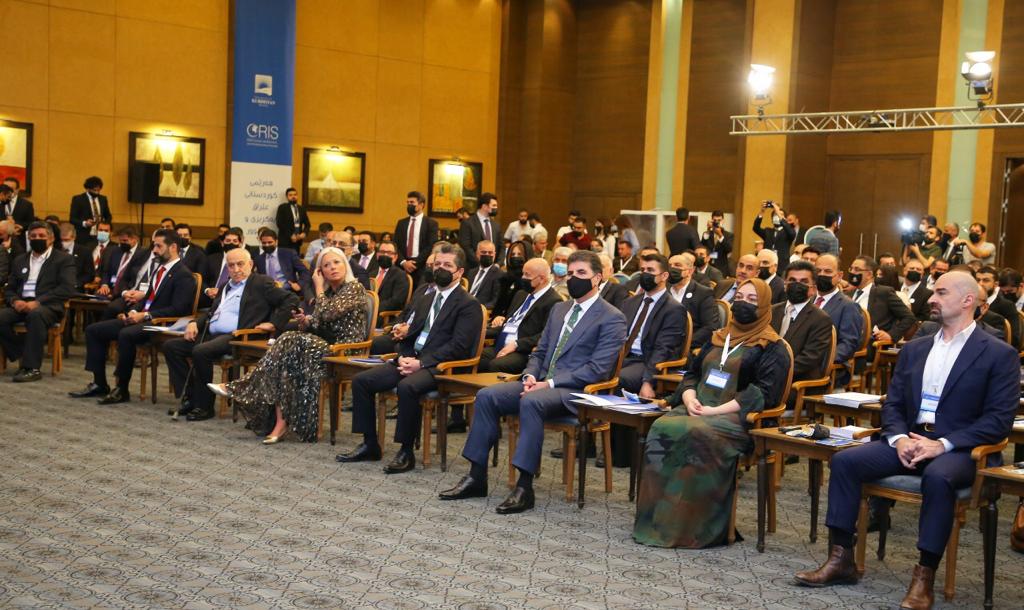
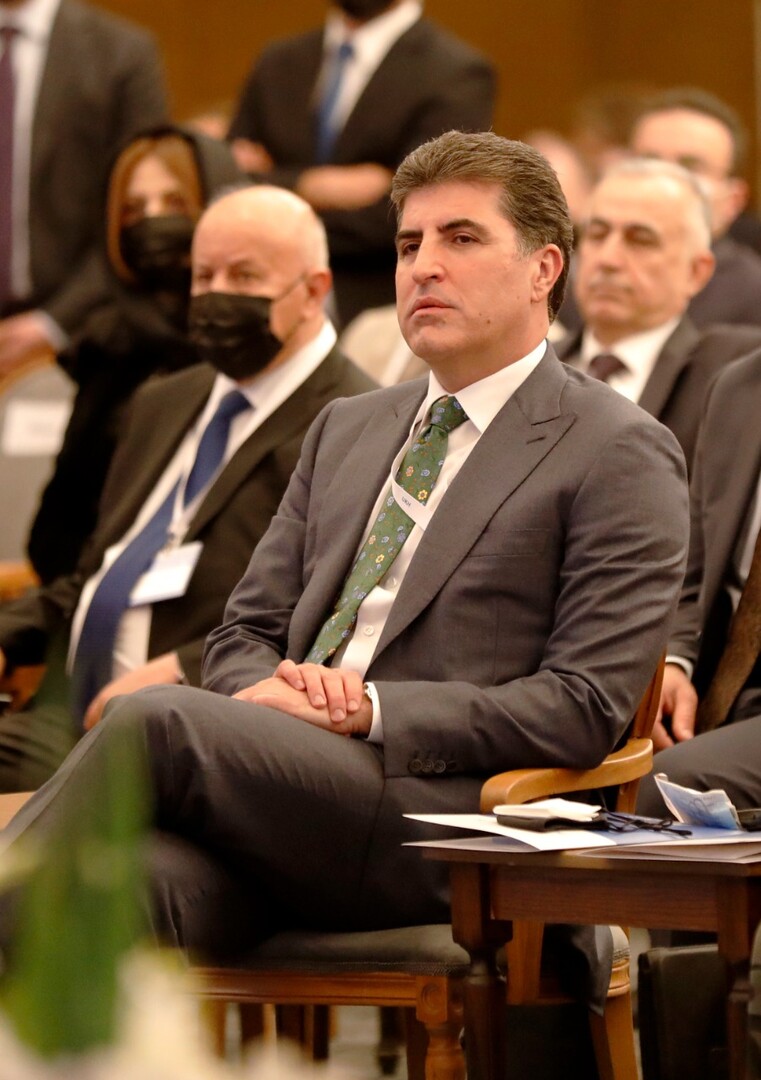
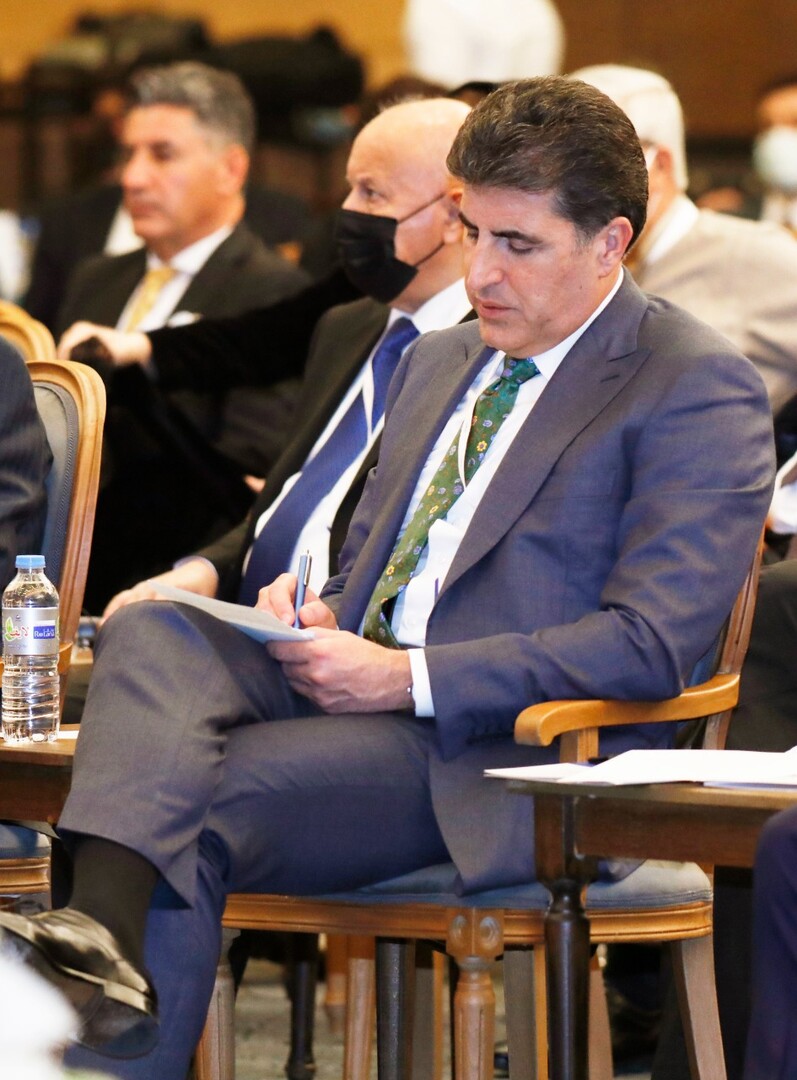
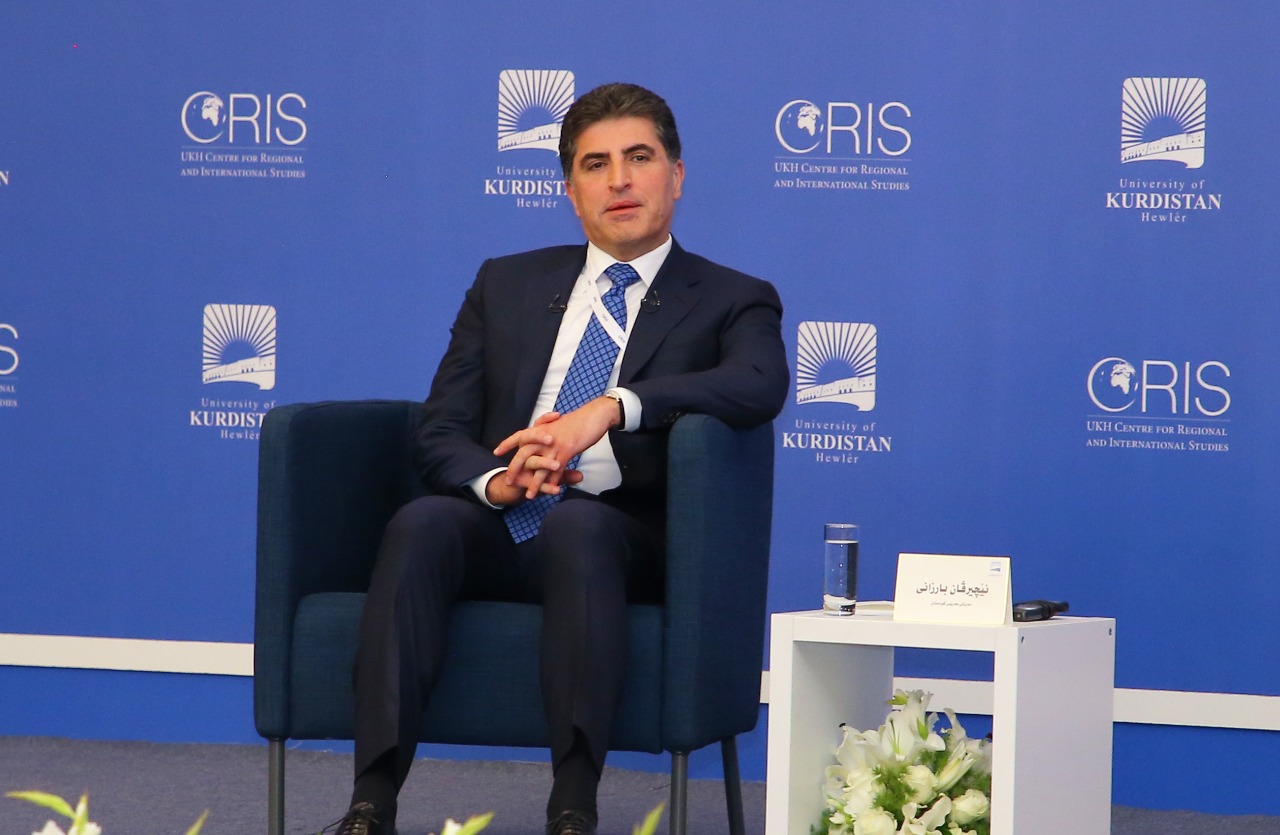
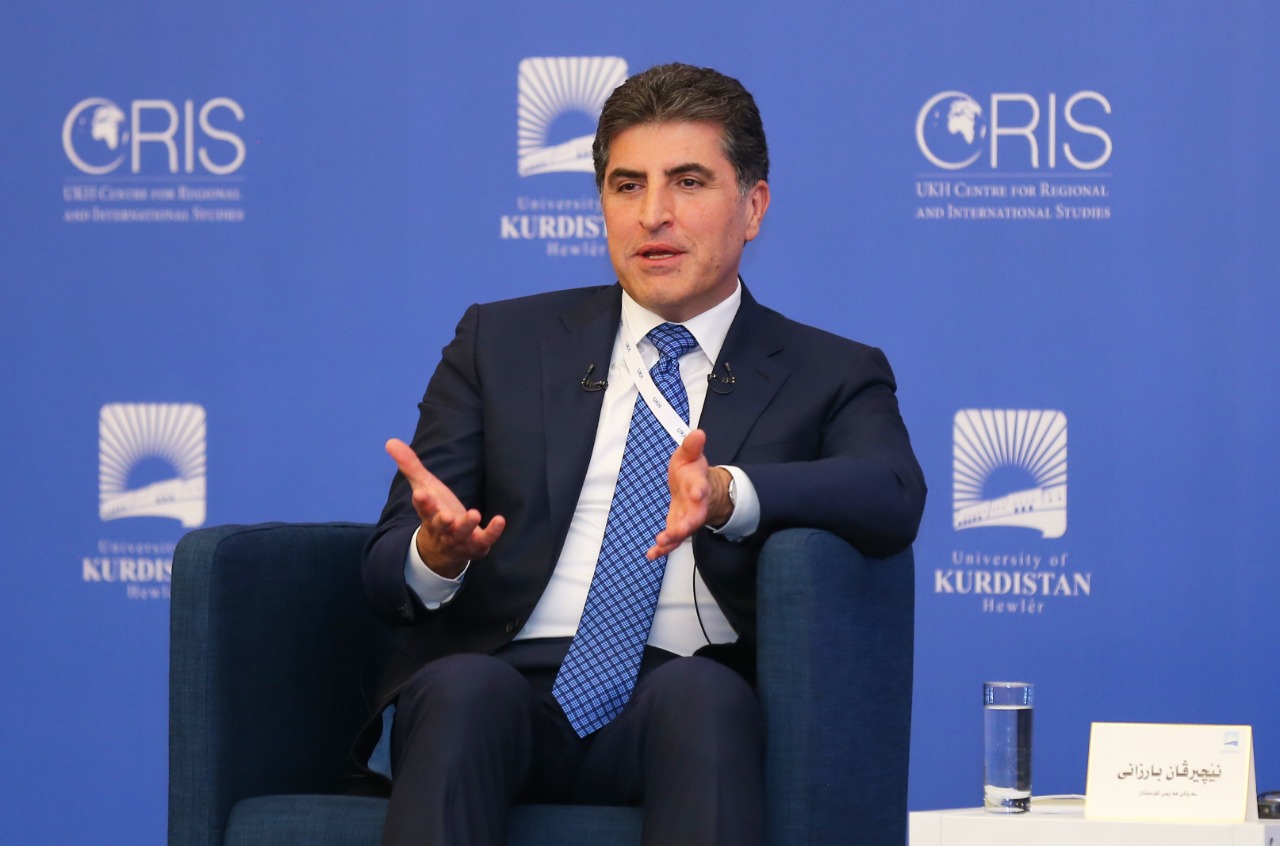
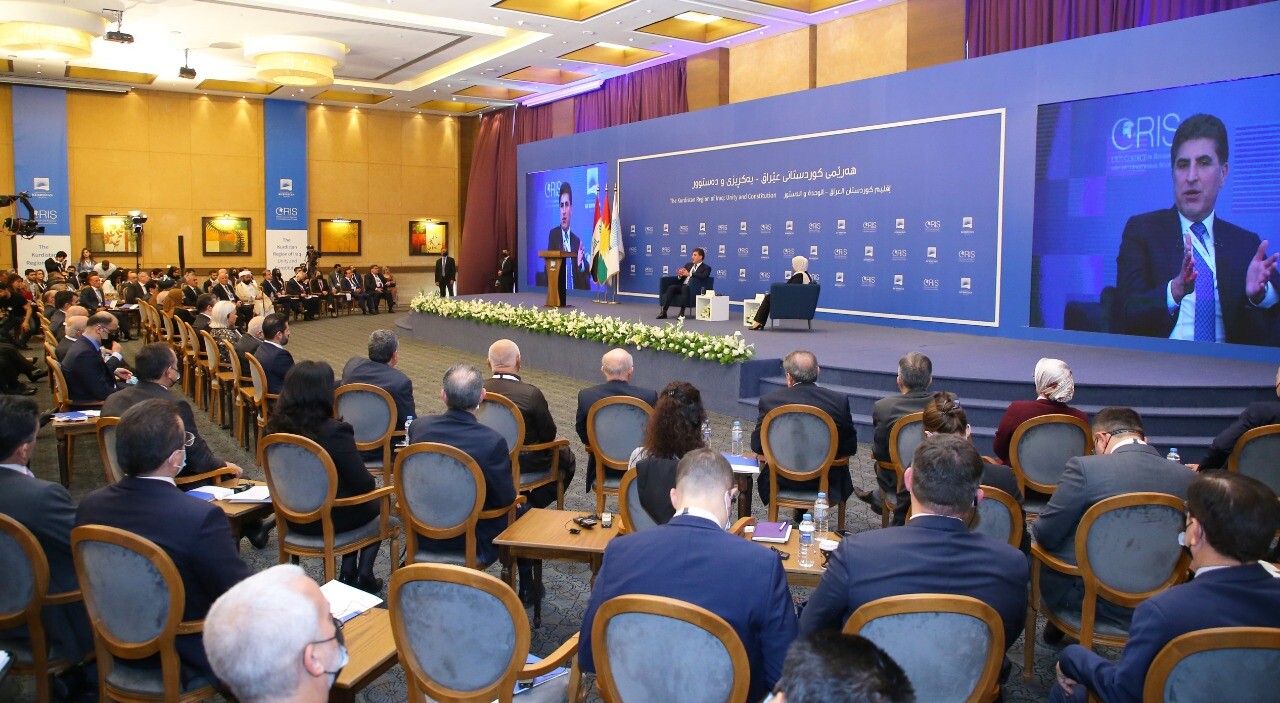
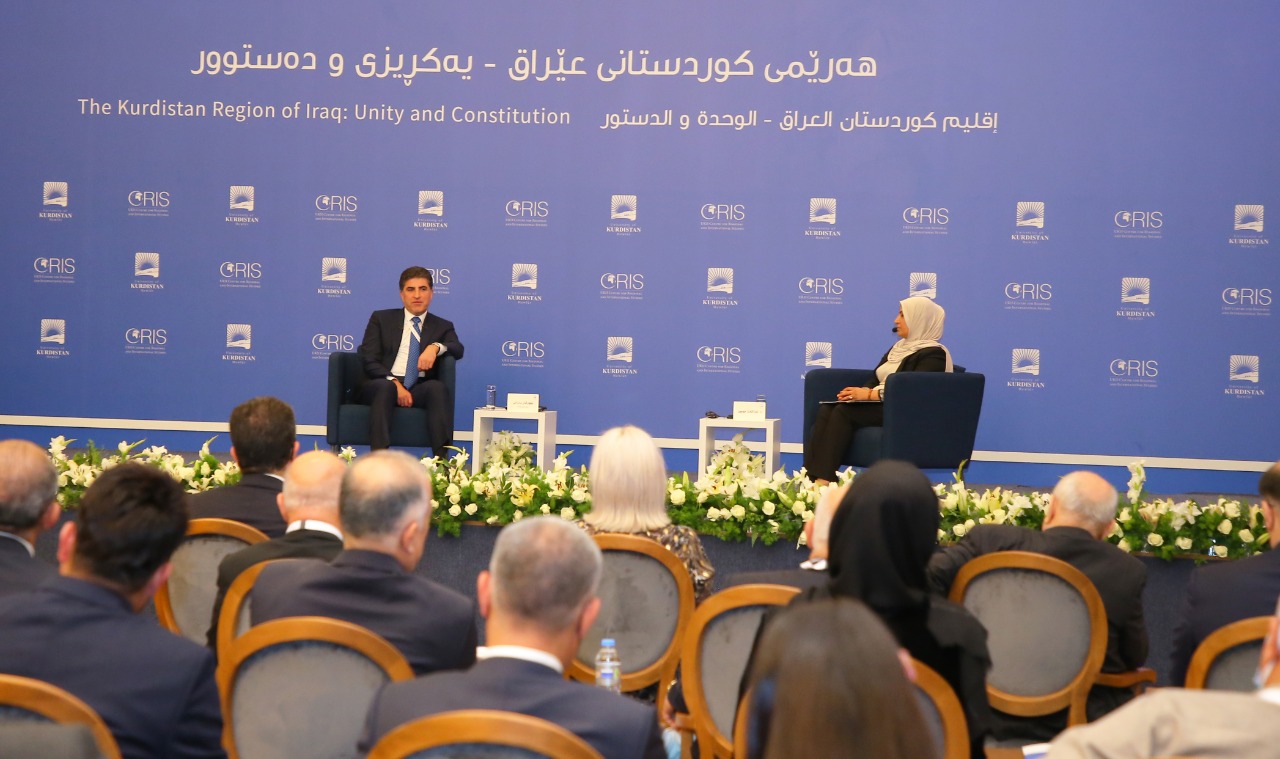
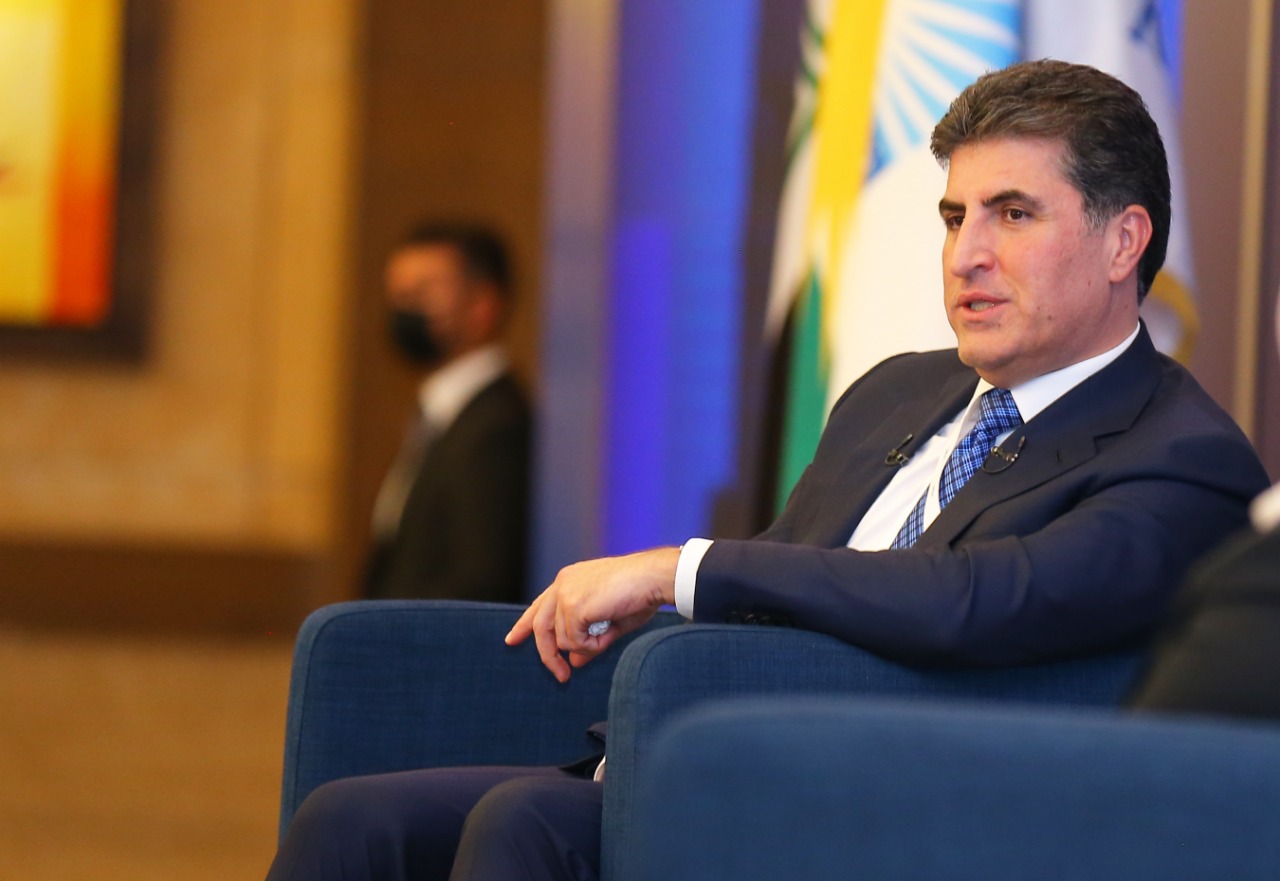
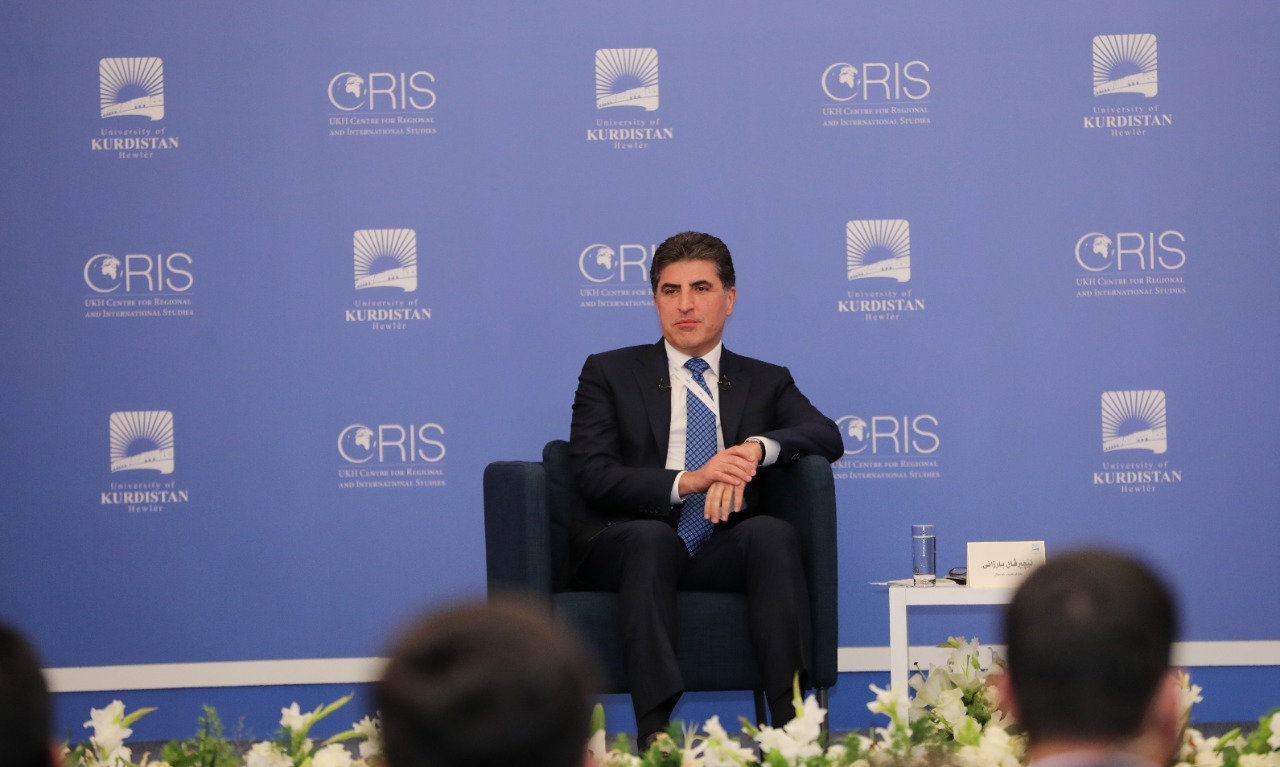
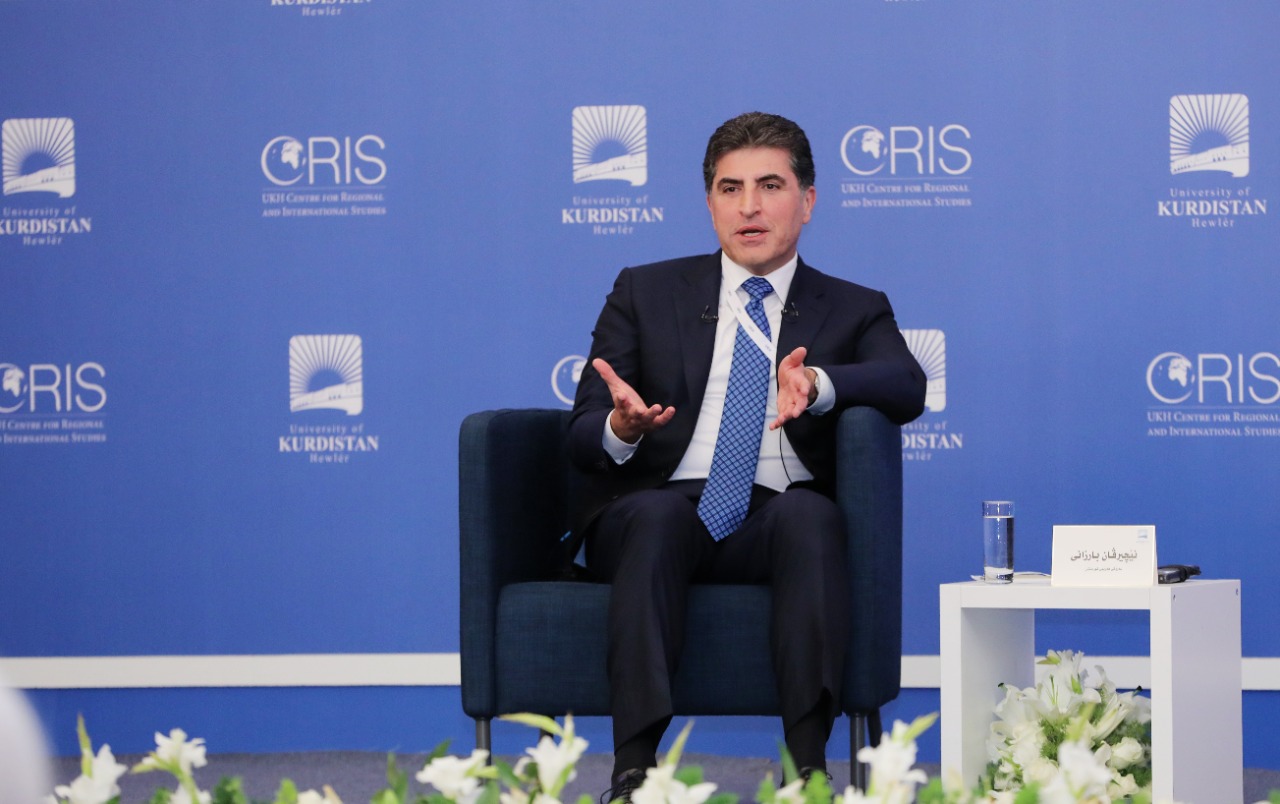
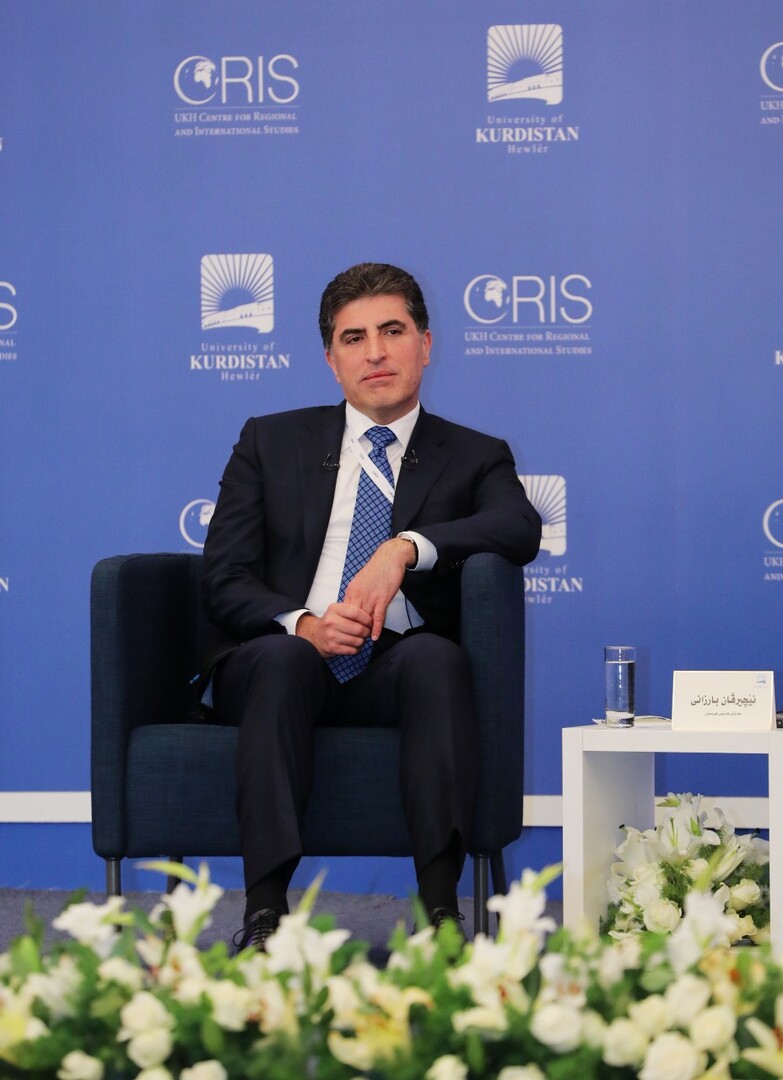
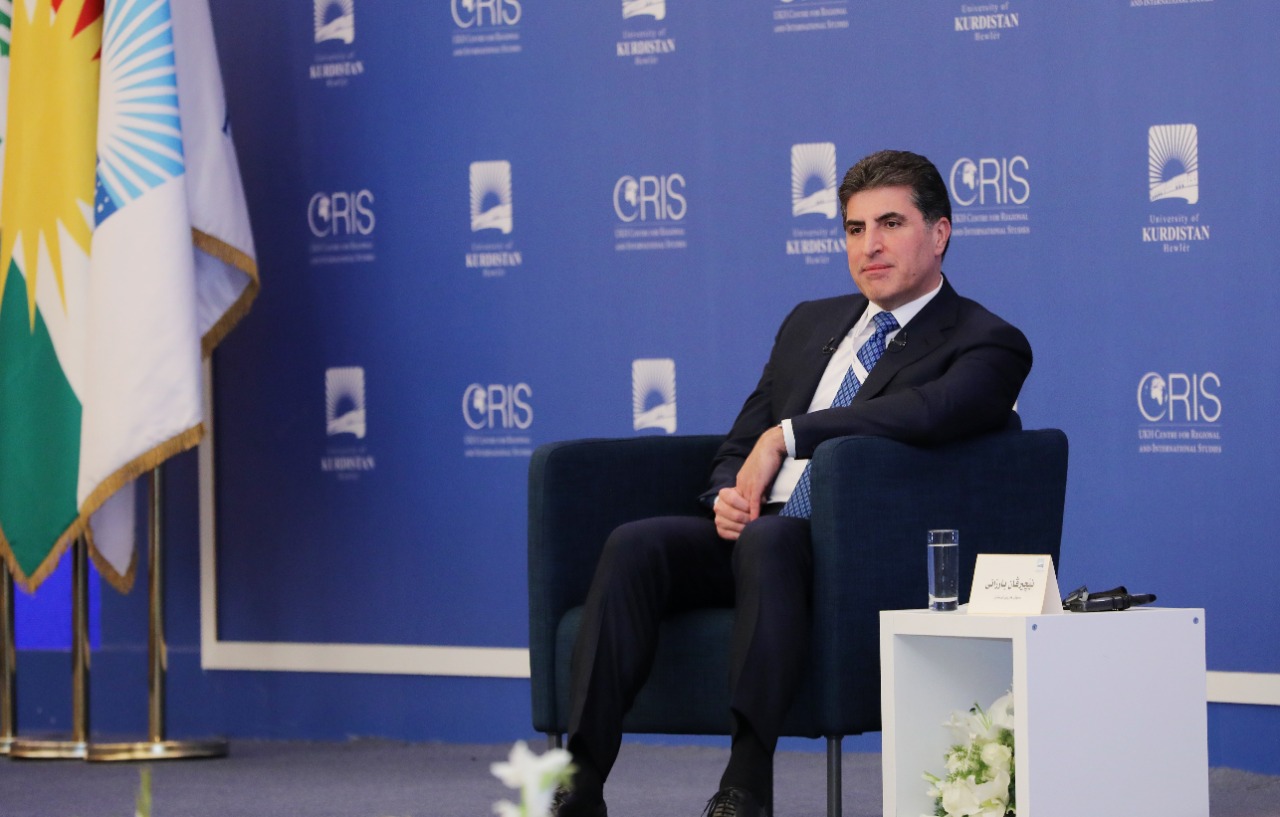
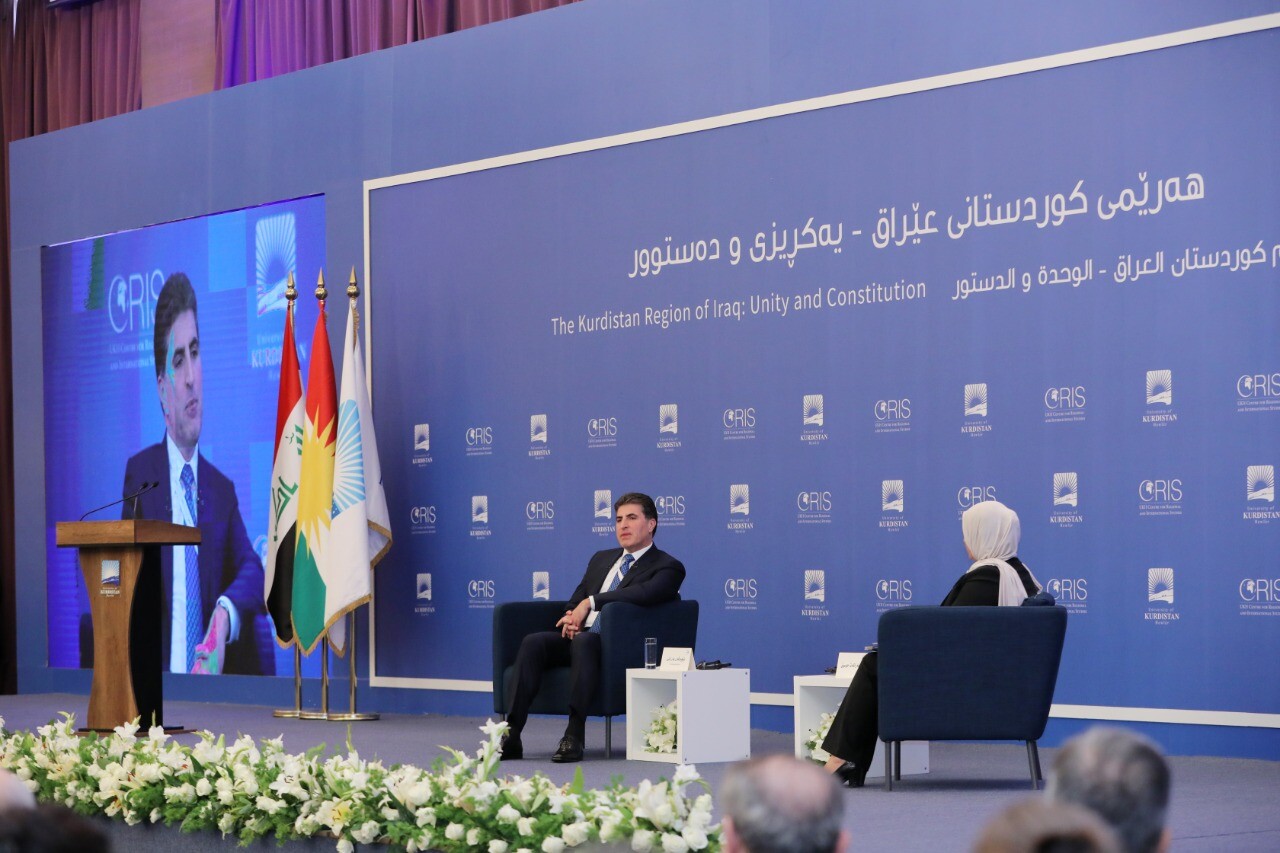
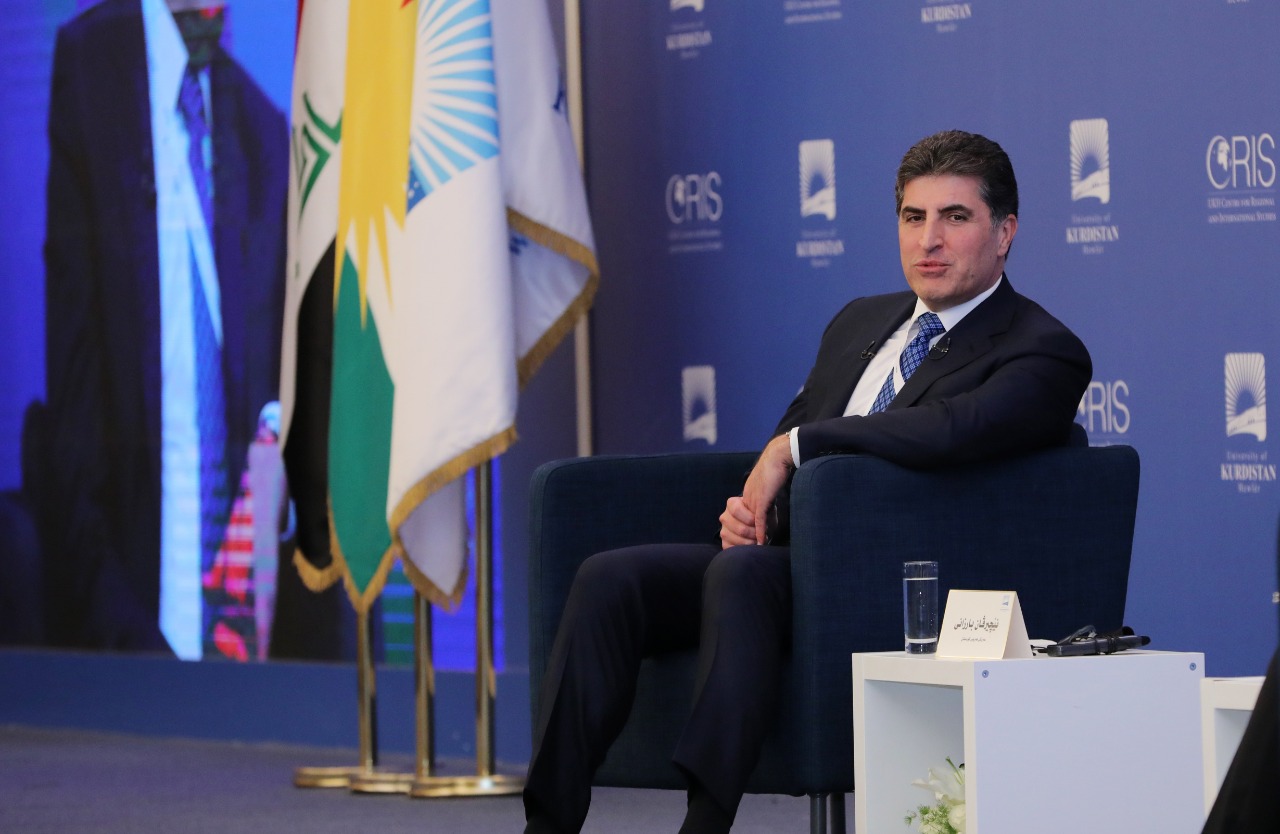
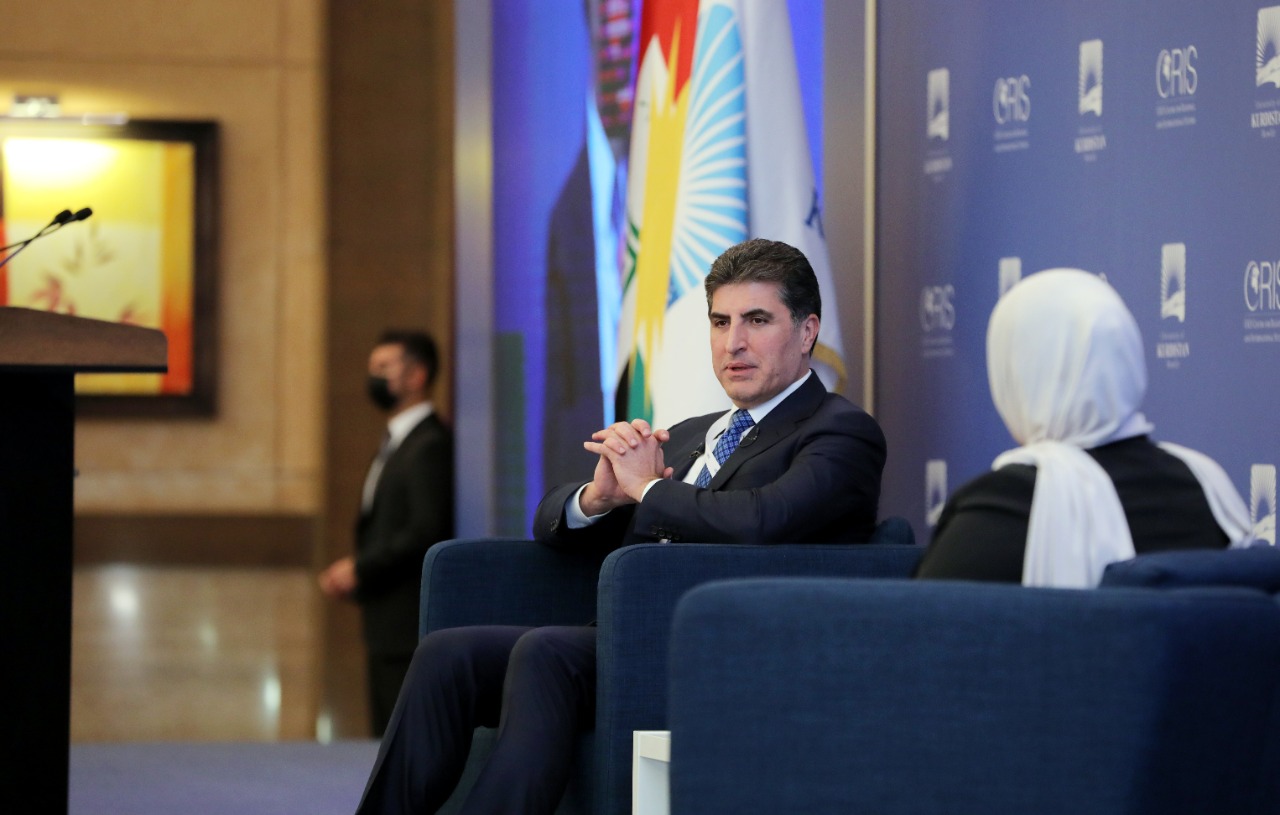
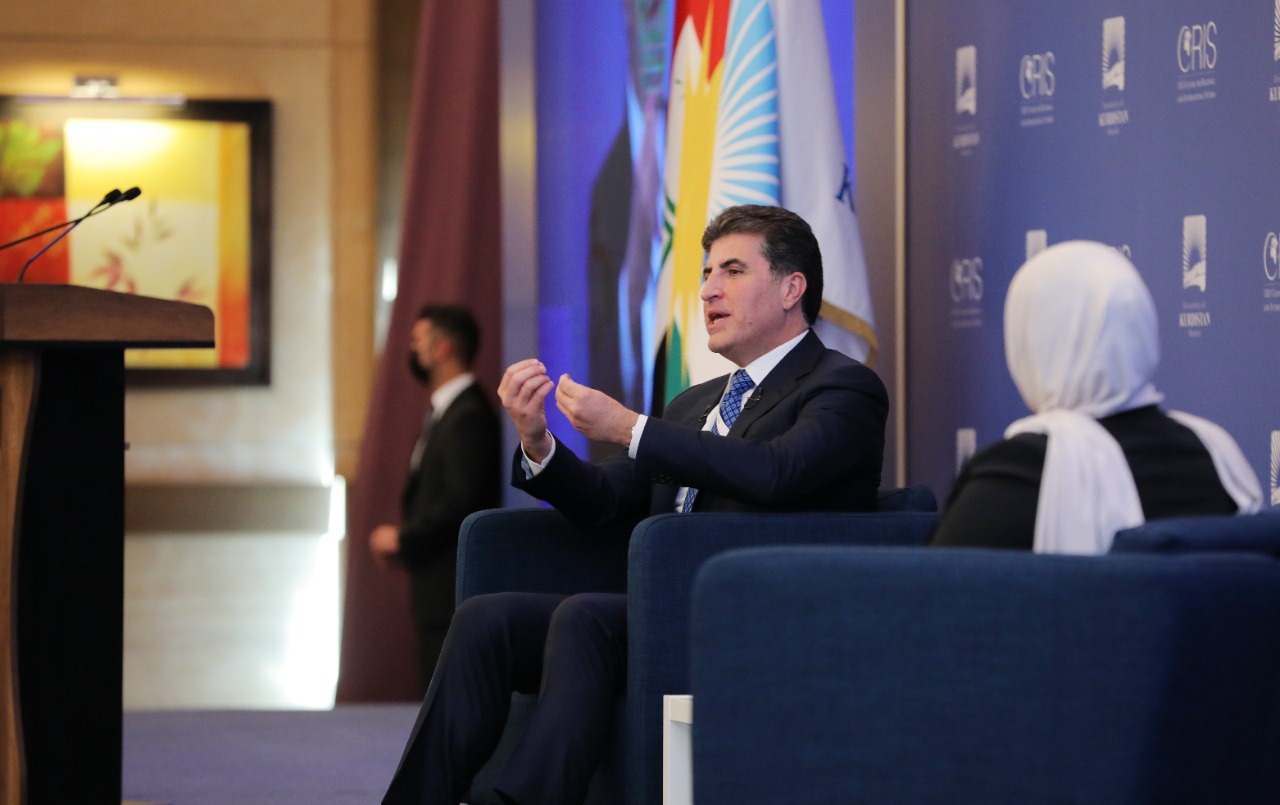
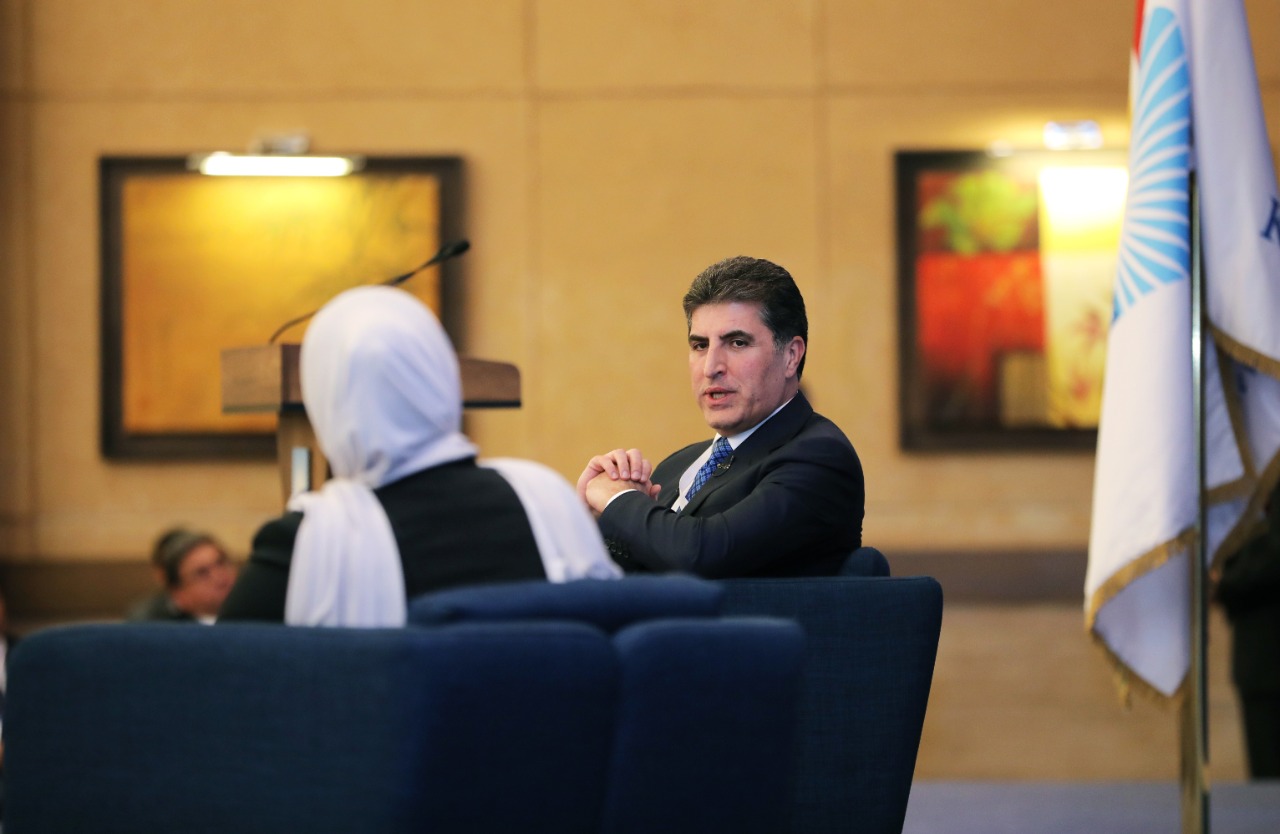
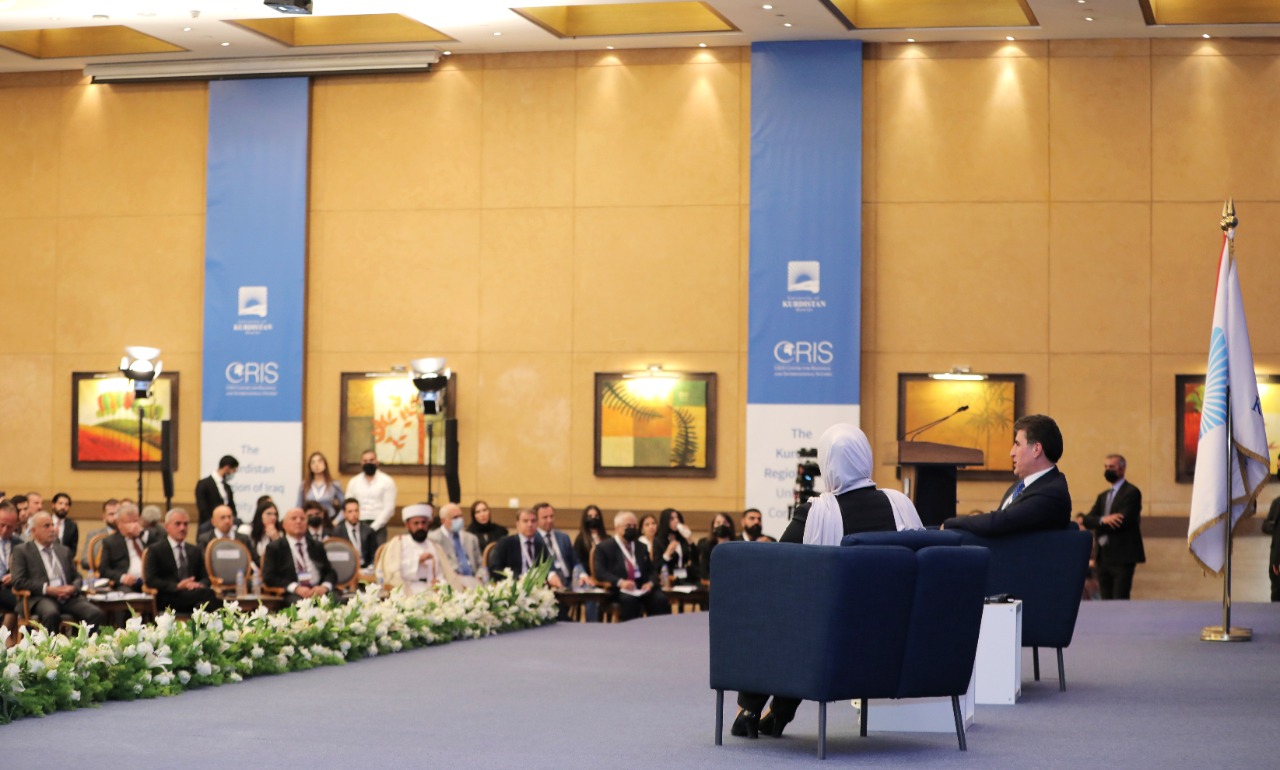
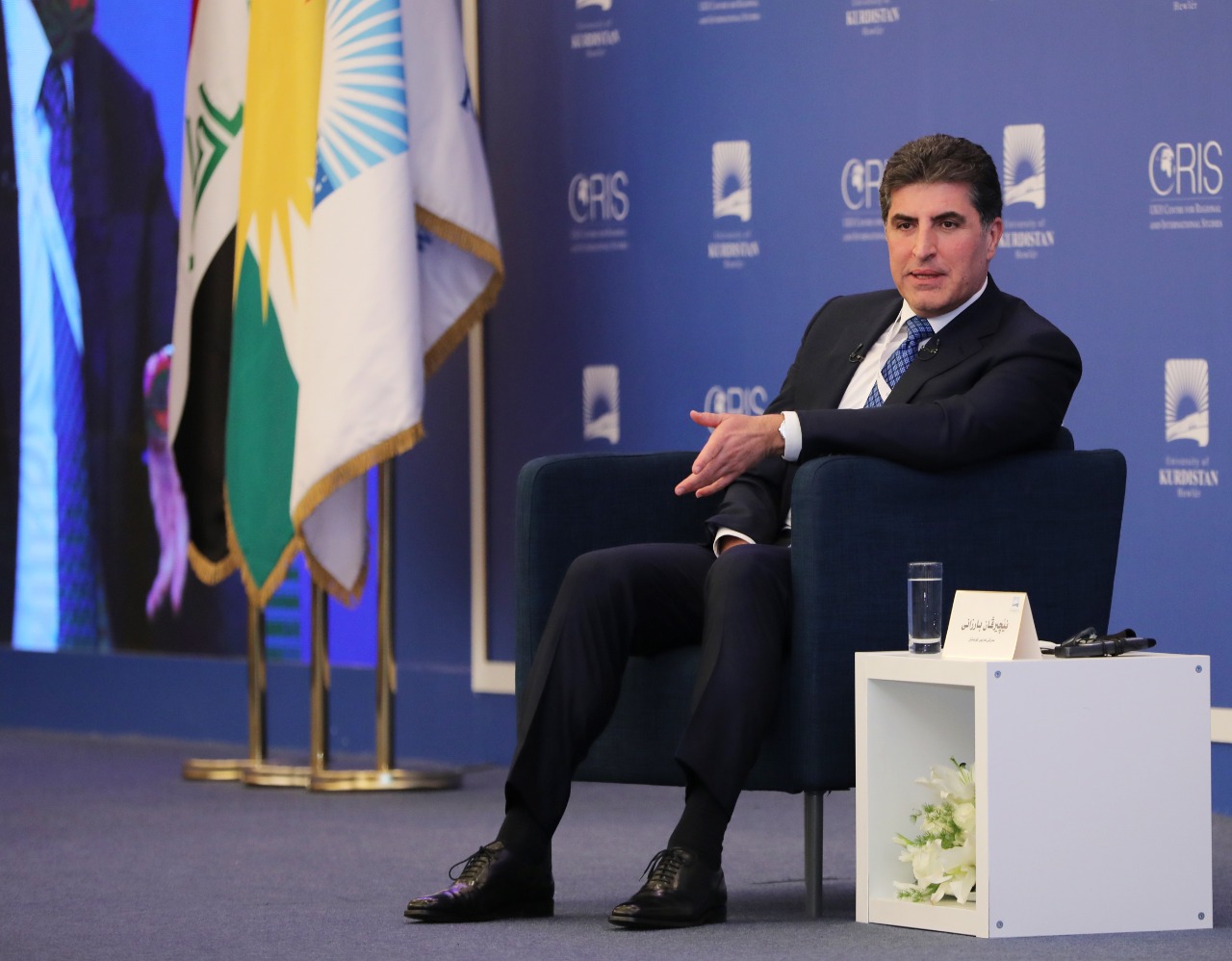
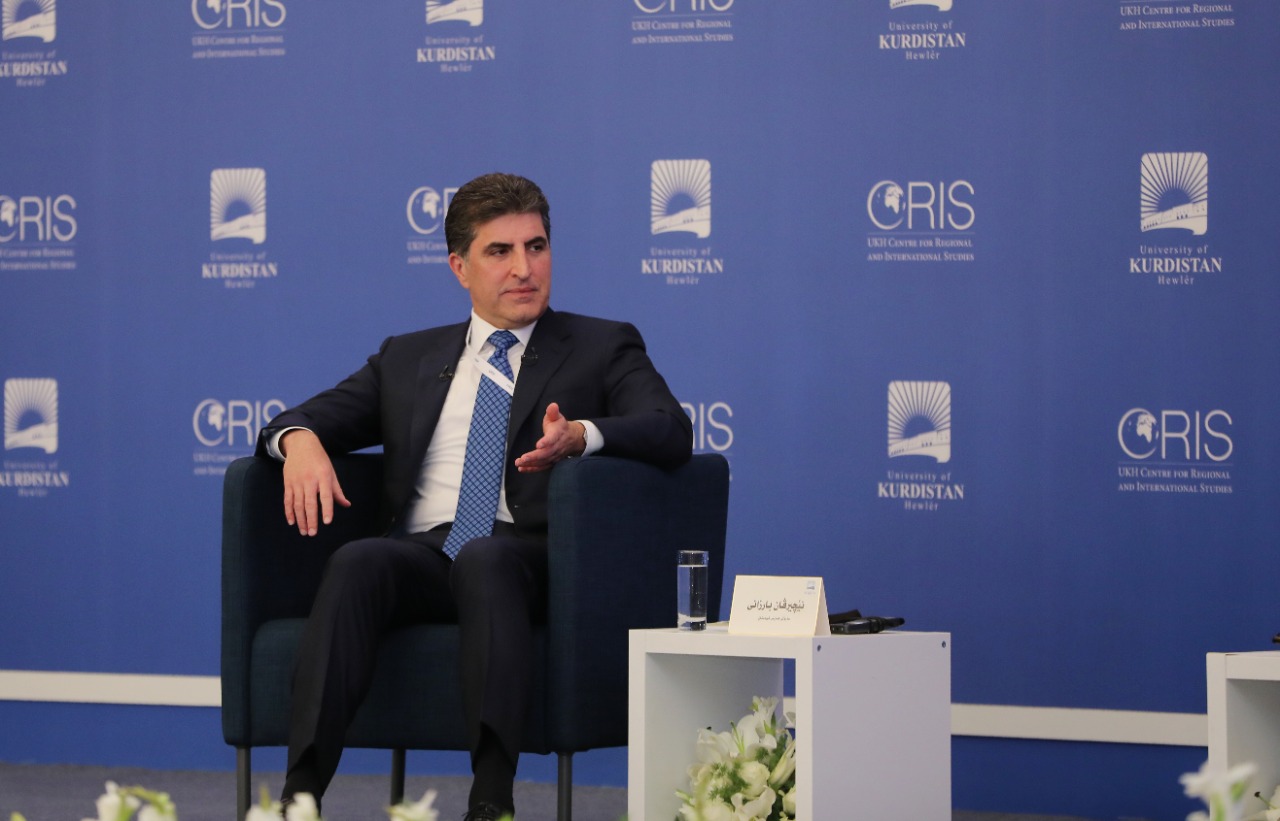
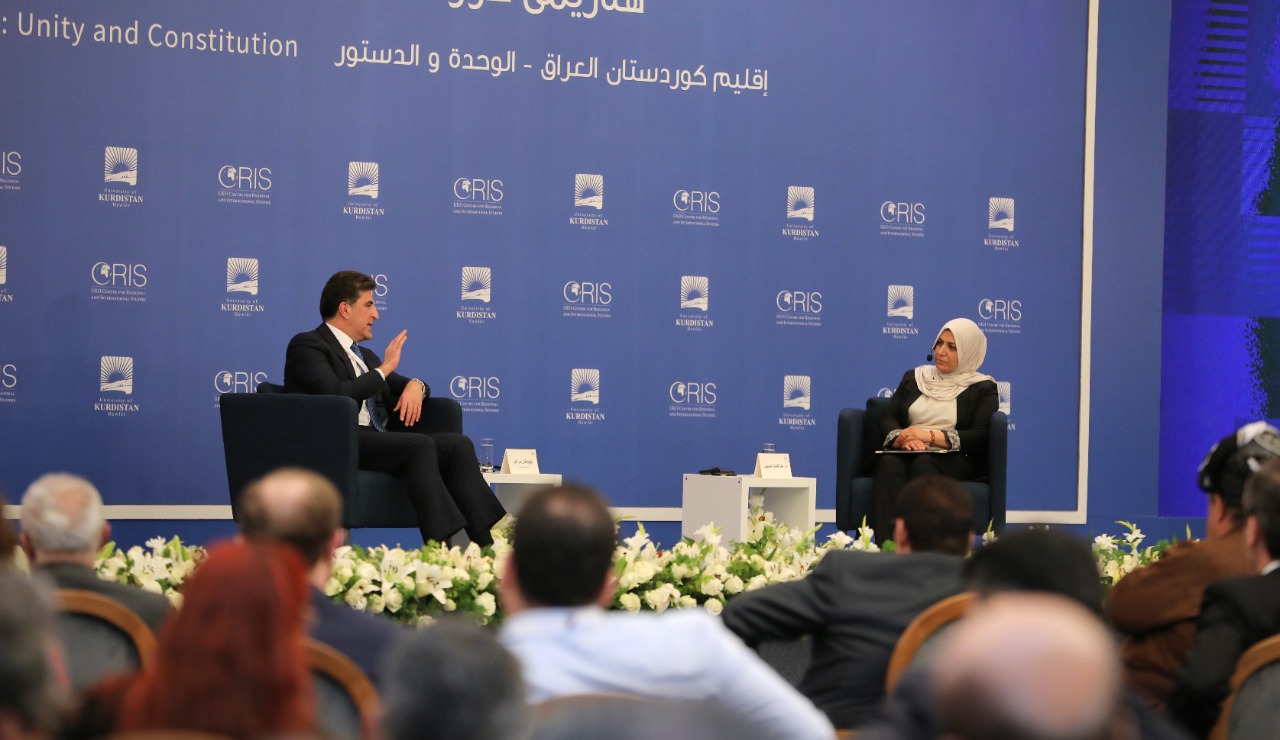
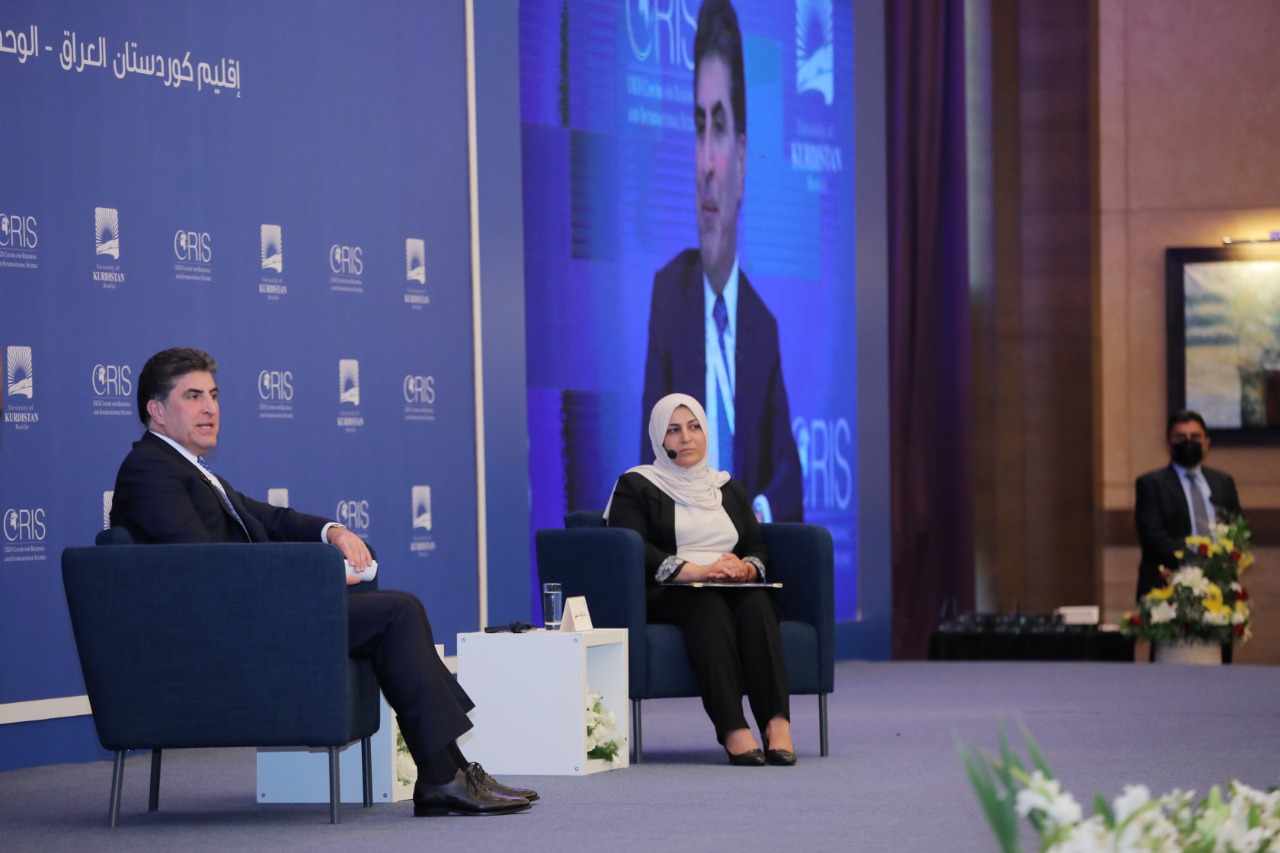
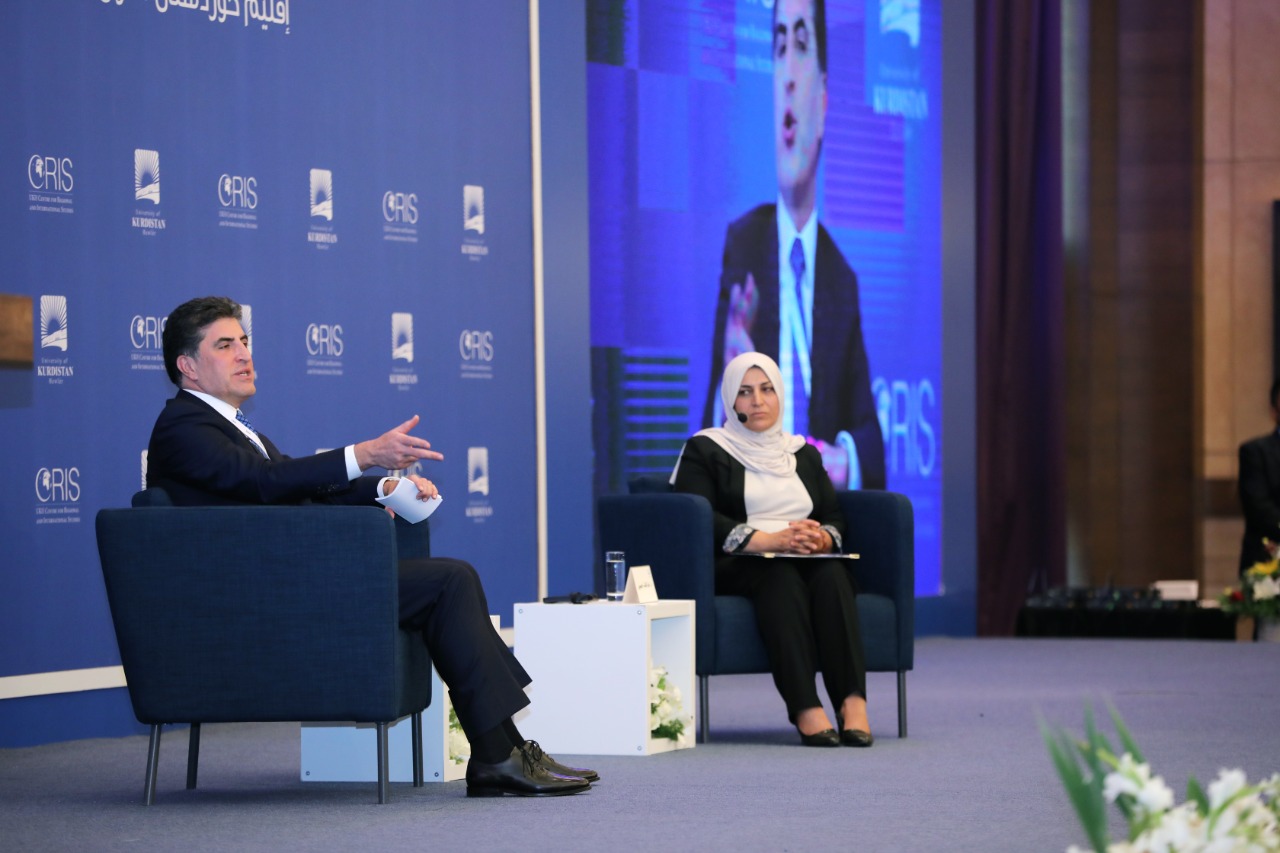
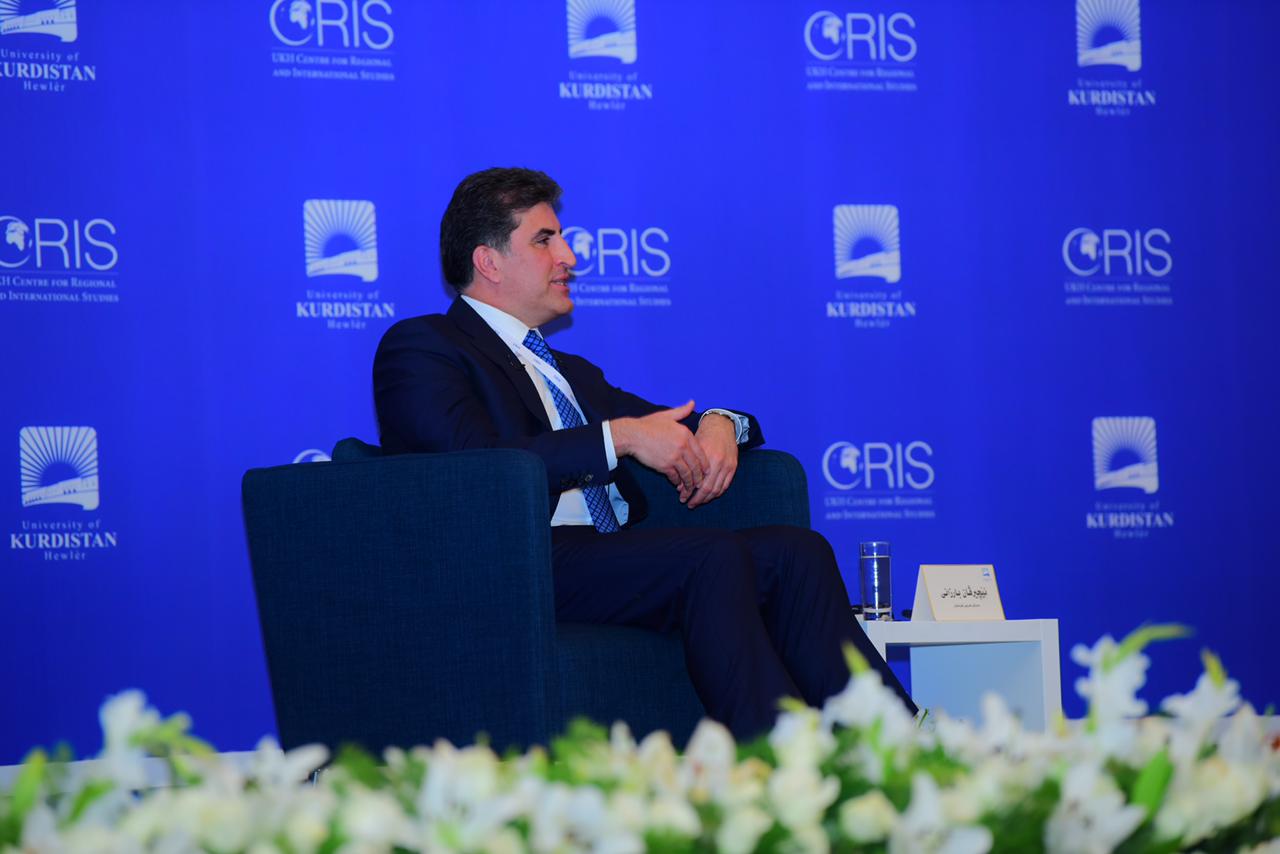
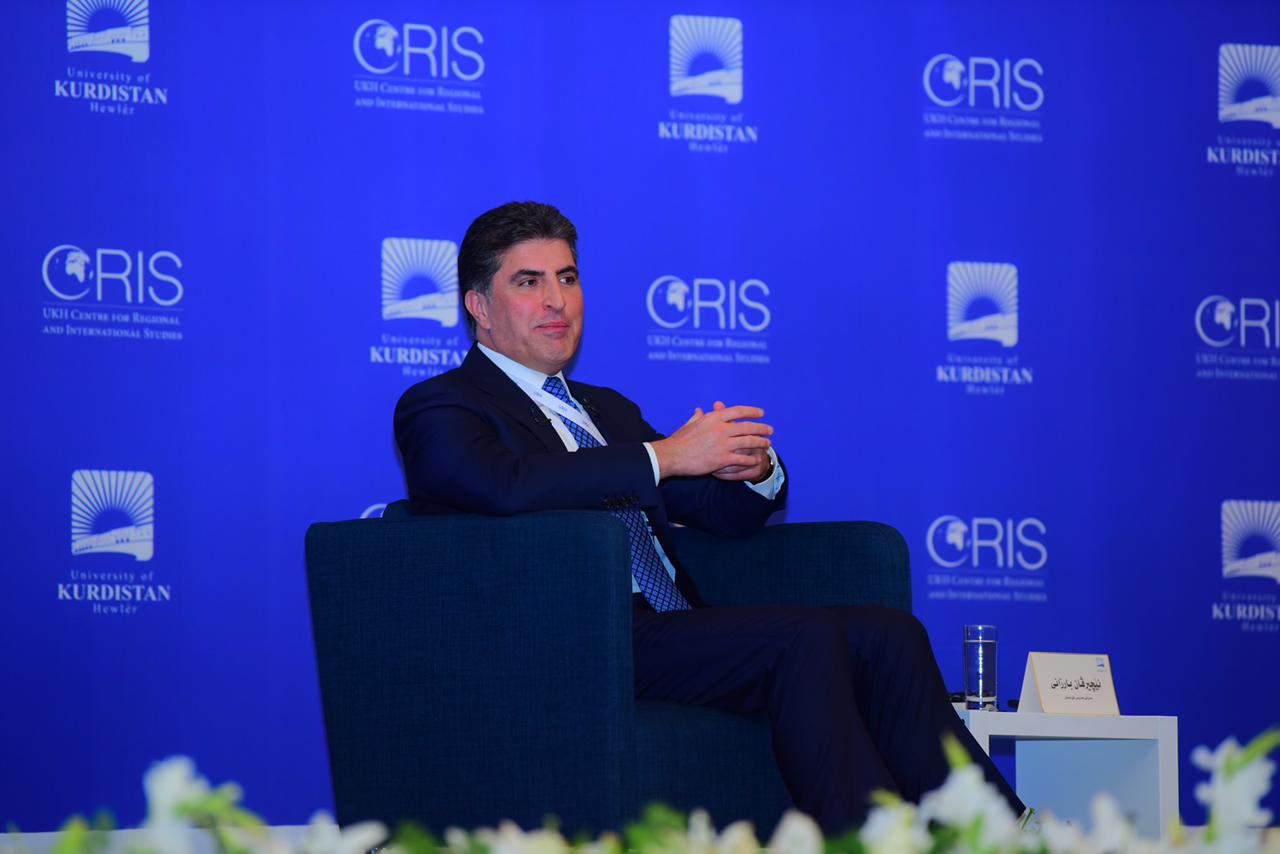
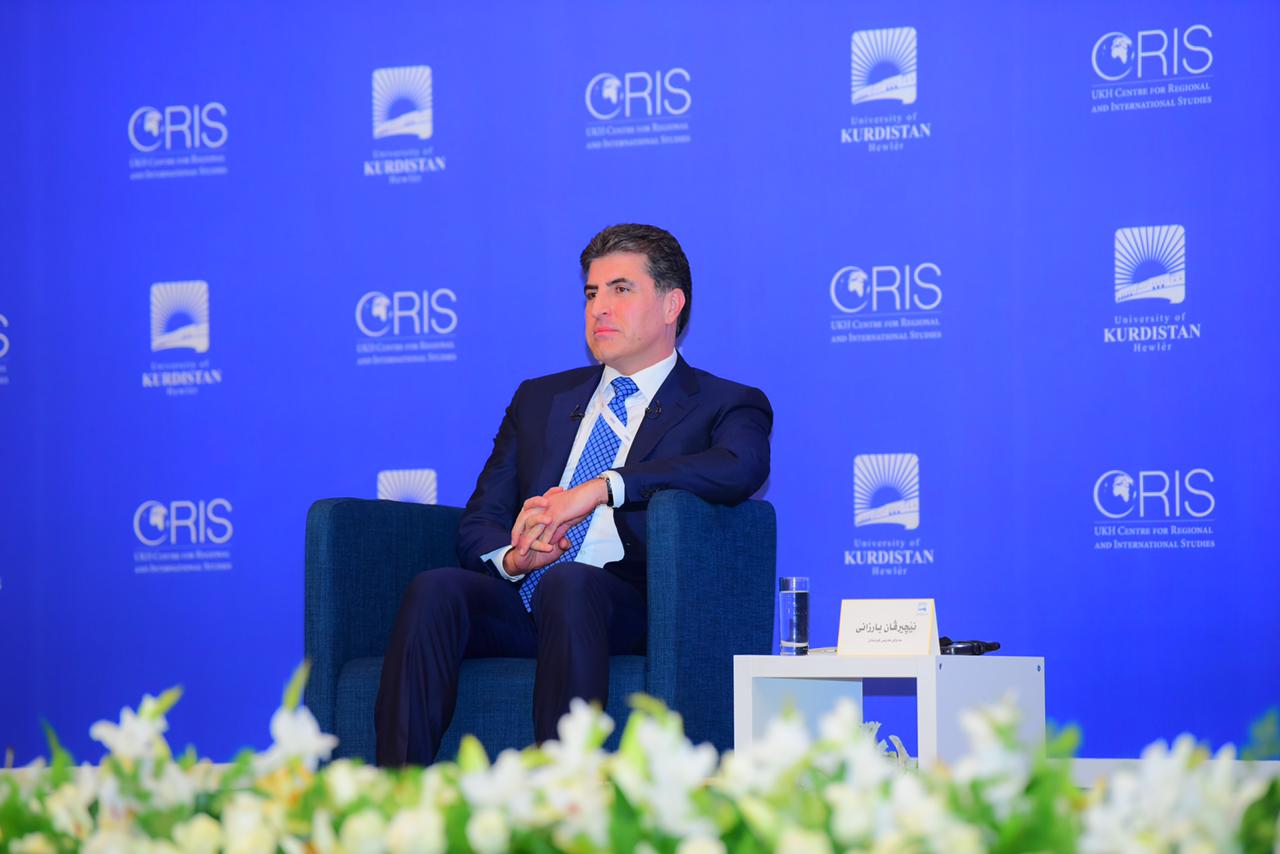
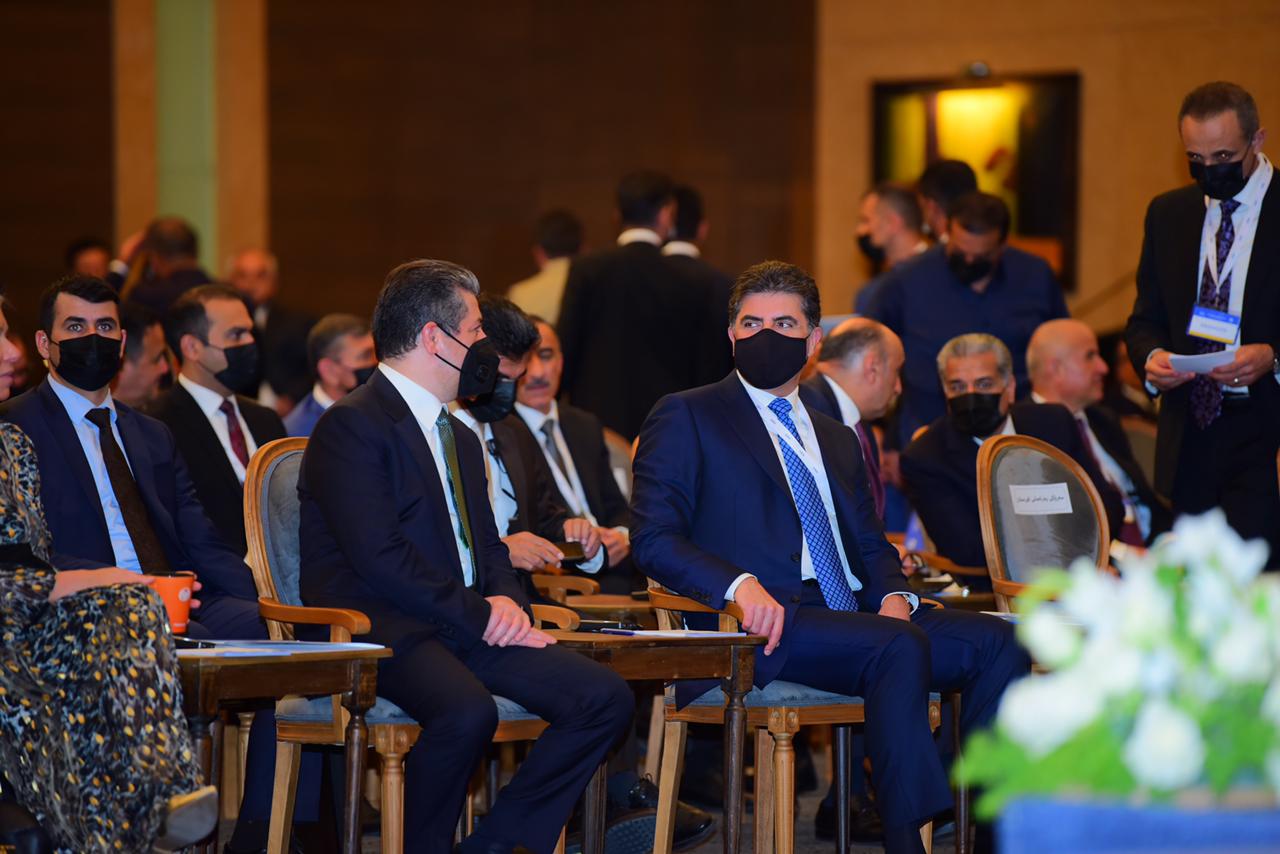
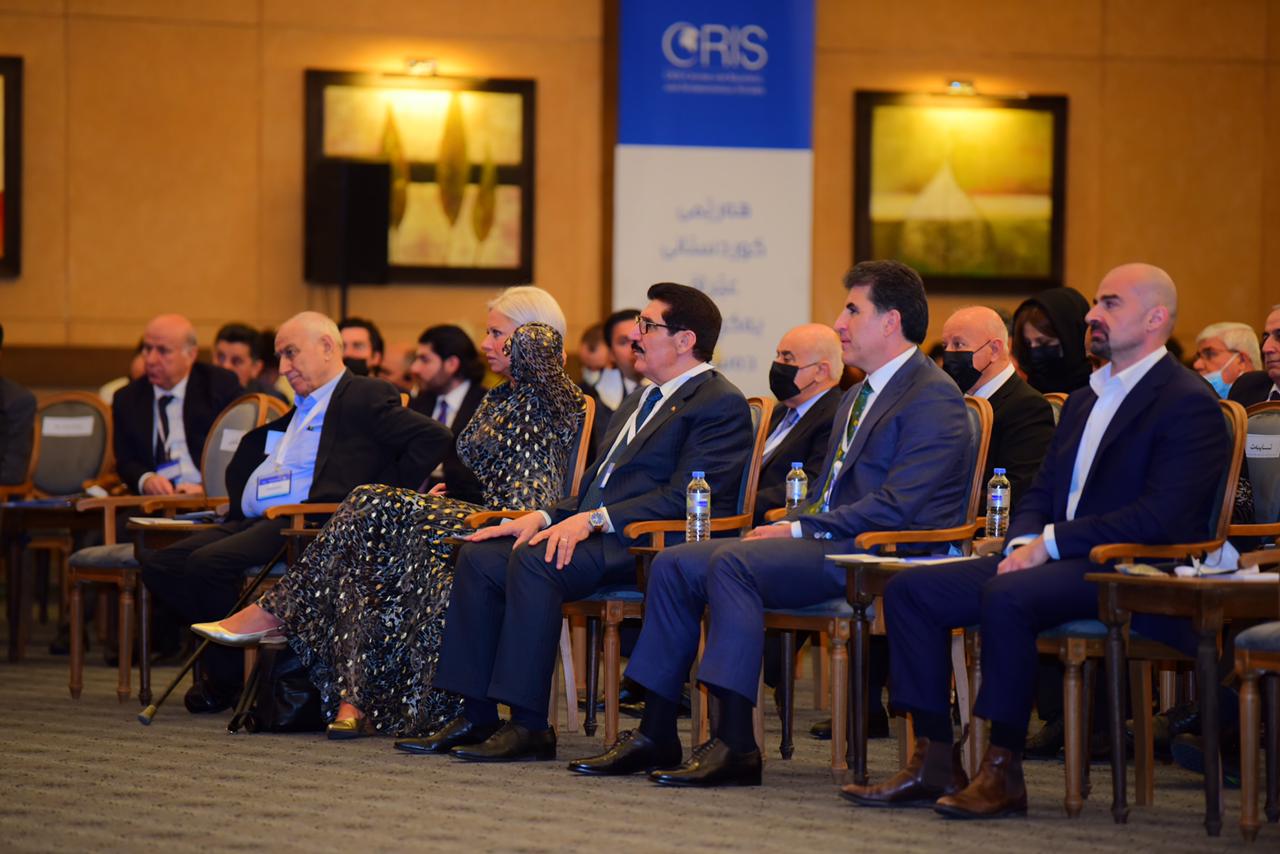
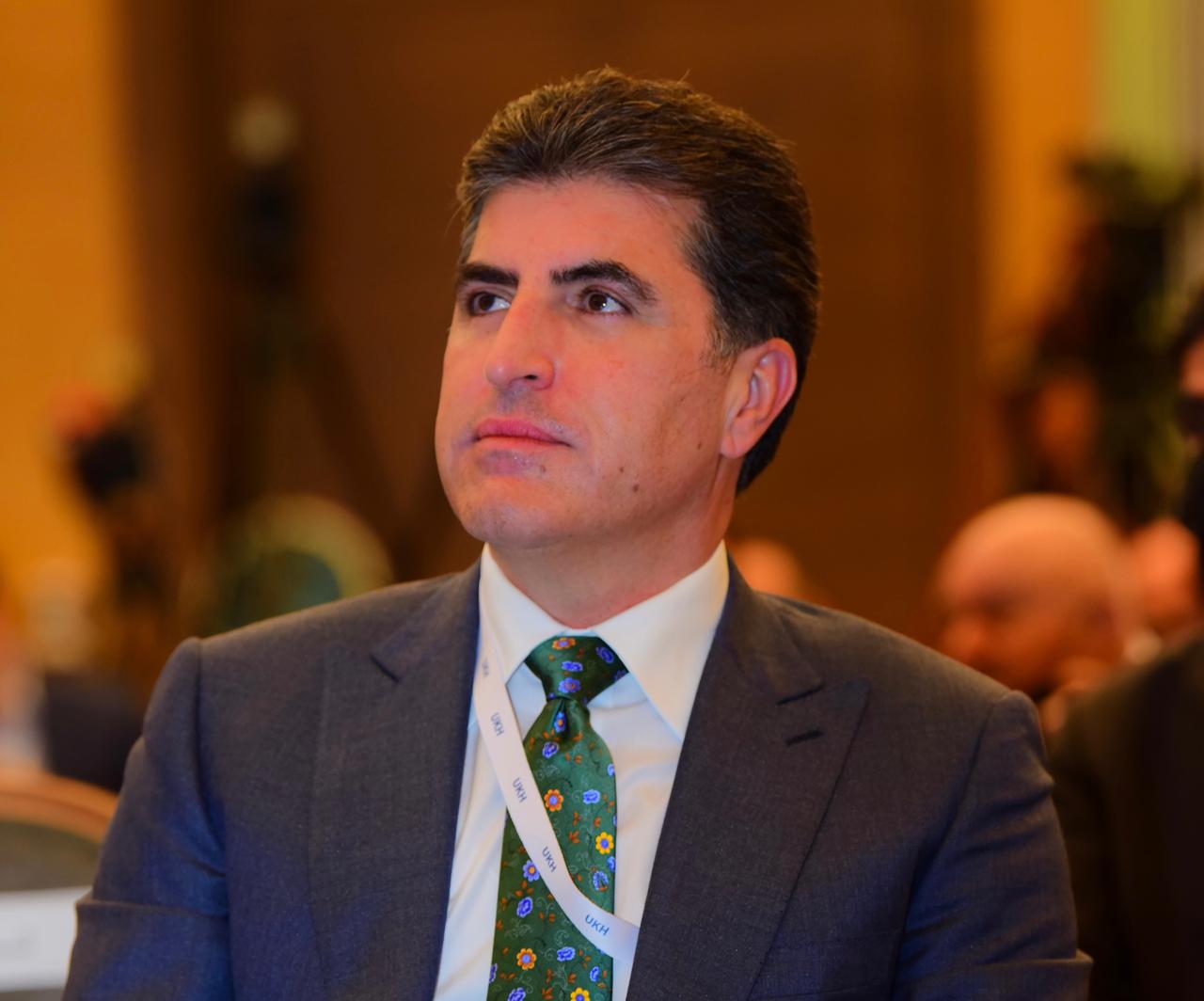
Kurdistan Region President Nechirvan Barzani attended “The Kurdistan Region of Iraq - Unity and Constitution” conference in Erbil on Wednesday and took part in the last panel discussion of the conference. Below is readout of the President’s address and answers.
At the outset, when answering a question about his opinion about the point of views that were expressed at the conference with regards to the constitution and unity, President Nechirvan Barzani stated: “I would like, in advance, to thank all the honorable attendees who enriched this conference with their comments and opinions. My thanks to the Special Representative of the United Nations Secretary-General in Iraq, whose participation in this conference and her long stay with us, since the morning, was a milestone, indicating her support for the political process in the Kurdistan Region and in Iraq. Thank you very much.”
Continuing his answers, the President stated: “There is no doubt that there was a lot of discussions and opinions about the issue of unity and the constitution (at the conference), and some of which I really agree with and I wanted to express them myself, and which were also expressed by the Prime Minister, Mr. Masrour Barzani, and the Speaker of the Kurdistan Parliament, Ms. Rewaz Fayeq. What I want to say about the issue of the constitution is that the constitution is a means to achieve a goal, so what is our goal in drafting the constitution? What is the objective we want to achieve? What do we want to do when writing it? We want the constitution to organize the political system in the Kurdistan Region, we want the constitution to be the rule of law in this country, we want the constitution so that all components of the Kurdistan Region feel safe in this country, and feel that they and next generations have a better future. The aim of writing the constitution is to protect and strengthen citizenship, which is the most important goal of writing the constitution. We have great diversity in Iraq in general, and we have diversity in the Kurdistan Region. These communities are in the Kurdistan Region, and we do not call them minorities, because the beauty of Kurdistan lies in this mosaic of coexistence and we all live together in this country. Here I remind you of a quote by the US President in 2014 when ISIS began to rampage towards the Kurdistan Region. In the context of his expression of support for the Kurdistan Region, he said, “There is coexistence (in Kurdistan Region),” So, the thing that we should always be proud of is that coexistence exists in this country, and the beauty of Kurdistan is reflected in all the nationalities that live in the Kurdistan Region. In that we are all Kurdistani. There is no doubt that this constitution should provide guarantees for these communities, and the conversations that took place today, especially those in the dialogue that preceded our panel, are the words of the nationalities living in Kurdistan, which have shown that they are not yet reassured. The constitution of the Kurdistan Region should provide guarantees for these communities. The constitution of the Kurdistan Region, and as Mrs. Rewaz Faiq indicated, they gratefully started working on it in the Kurdistan Parliament, and then they discussed it with us as well. It has now become clear that we need more discussions on this issue with the political parties and civil society, because the constitution, as His Excellency the Prime Minister mentioned this morning, and I want to emphasize what he said, is not specific to a single party, nor is it for a specific nationality, or a specific community, but rather the constitution is for all the people who live in the Kurdistan Region, and for this it must be a reflection of the orientations of all components that live in the Kurdistan Region. This is important. We, in the Kurdistan Region Presidency, in cooperation with the Kurdistan Parliament and the Kurdistan Regional Government, will begin to take practical steps to write the constitution. We have met with some parties, but our journey is not over. We will visit the other parties, and we will stand on this issue very seriously. We want it to be a constitution for the Kurdistan Region to which all components of the Kurdistan Region are reassured and place hopes on."
Regarding the issue of unity, the President of the Kurdistan Region stated that “unity is a very, very important issue throughout our history and during the periods in which we have been united. There is no doubt that we as parties are very different from each other, but we have to agree on one thing, on a unifying identity for us, on something that unites us all. For example, during the ISIS war, the Peshmerga represented the identity that brought all the people together, and it was a great honor. In that war, no one said that this is from the Patriotic Union of Kurdistan, or that is from the Kurdistan Democratic Party, or the other is from the Change Movement, or this is Christian or that is Yazidi. Rather, Peshmerga belonged to all and everyone. An identity for us to agree on. The constitution may be one of the chapters and matters that show us what our duties are and what our rights are. If everyone knew this, we could develop the concept of citizenship in this country more effectively. There is the issue of the principles that have preserved the Kurdistan Region until now, and let us look at these stages: since 1991 when the Kurdistan Front was formed and all forces participated in it, we were able to achieve great gains, because we were together. In the other periods that followed, we were together when writing Iraq's constitution, and we were together to a large extent in the ISIS war, and in the recent period when some events happened in Iraq's parliament, we were together and we were able to achieve some gains. But the question is: Has the mission of our unity ended, or should we strengthen it further? We must know the fact that what has been affirmed for the Kurdistan Region in Iraq's constitution is a very important historical document. The only historical document in our hands after 1970, is Iraq's constitution that was written after 2003. But let us ask ourselves a question: Has Baghdad been implementing the Iraqi constitution and the constitutional rights of the Kurdistan Region since 2003? No, they have never done this in all respects. We were in this situation in 2003, and nothing has changed after the fall of the previous regime. But if we ask all the Kurds and say: Are you assured of your future in this country? I think everyone will say with one voice: No! Unfortunately, most of the constitutional articles related to the Kurdistan Region have not yet been implemented. How do you apply these? How is this constitution implemented? The first condition for its implementation and our endeavor to implement it is to be together. With this fragmentation, we will not be able to help ourselves or Iraq. There are many challenges facing the Kurdistan Region today. We have agreed on the budget, the Prime Minister is here, as well as the Deputy Prime Minister, and nothing has been implemented from the budget agreement until now. Iraq has not yet met the Kurdistan Region with any of the matters that have become laws. Our duty is to be together and to be united, so much is ahead of us to achieve in Baghdad through this unity. We believe in the federal system, and we believe in solving our problems within the framework of Iraq and according to the Iraqi constitution, we want to implement the constitutional articles that have a relationship with the Kurdistan Region. The Iraqi constitution guarantees the Kurdistan Region the right to have its own constitution, and the constitution that the Kurdistan Region will have must ensure the continued protection of the values that the Kurdistan Region has always maintained, and are represented in democracy and freedom of expression, which are the principles that distinguished the Kurdistan Region from the rest of Iraq. Here comes the question: Have there really been no gains as was said (earlier at the conference)? We have made very big gains thanks to the allegiance of the people of Kurdistan, the struggle of the Peshmerga, the blood of our martyrs and their efforts, and what we had was not little. But is everything in this country all right and are we not suffering from any problems? No, there are a lot of problems, but the important thing is that besides the existing problems in the Kurdistan Region, we are seeing progress in some areas. The issue of the economy is a big problem in this country, and the financial problem is a big problem, but nevertheless we find that the Kurdistan Region has made great progress in a lot of the stages, this was achieved as a result of the unity. This is not the source of pride for a party alone, but it is a source of pride for all the people of Kurdistan. And if it were not for the support and allegiance of the people of Kurdistan and the understanding of the Kurdistan Region’s employees, it would have been impossible for the Kurdistan Regional Government to continue until now. There is no burden in the world for a prime minister and deputy prime minister heavier than being unable to secure full salaries to civil servants. We should know that the task of the Kurdistan Regional Government is difficult. It is true that there were problems in the past and there are problems now, but in fact we have made good progress. Good progress has been made in matters of transparency, oil, oil auditing and the budget, and let us not underestimate these matters. All parties participating in the government must realize their duty, and feel that they are apart of the political process and decision-making in this government, and in this way we can work together. We must overcome this difficult stage before us. We will write this constitution, but it must be a constitution agreed upon by all parties. We must protect this unity of ranks and continue our efforts until we achieve the gains that are included in the Iraqi constitution. Ahead of us is a very sensitive stage, before us the issue of the Iraqi elections, it is an important stage and all parties are busy reorganizing their ranks in preparation for these elections, and we are in the Kurdistan Region, if we are divided and go all the way, we will not be able to achieve any gains for the Kurdistan Region and for its people, but if we all come together, there is no doubt that we will be able to overcome this difficult stage, God willing.”
On the political stability and efforts of the President within the Kurdistan Region and Iraq and the continuation of his efforts and their results, President of the Kurdistan Region said: “There is no doubt that our efforts will continue, whether within the Kurdistan Region, in Baghdad, or with the outside world. There is great political support abroad for Iraq and the Kurdistan Region, and we must invest in this political support in order to be able to solve our problems with Baghdad within the framework of Iraq and in accordance with the Iraqi constitution.”
With regards to external political support and the speech delivered by Ms. Jeanine Hennis- Plasschaert, the Special Representative of the Secretary-General of the United Nations in Iraq, and the impact of all this on the steps taken by the President in the Kurdistan Region and Iraq, President Nechirvan Barzani said: “The mission of the United Nations in Iraq are known and announced, Ms. Plasschaert supervises the UNAMI office in Iraq, and the mission of this office is to help the Iraqis solve their problems. Thankfully, they had a positive role so far and made serious efforts to solve problems among the Iraqis themselves by all means. In a message to the United Nations, we asked, on behalf of the Kurdistan Region, to further empower the role of UNAMI in helping to solve the existing problems between the Kurdistan Region and Baghdad, and what we aim to obtain as a result is to achieve political stability in the country. Without solving the existing problems, political stability will not be established in Iraq. We find ISIS more active than before in the areas known as Article 140 areas, and it constantly seeks to sabotage stability and security in these areas, and if we want political stability to be achieved in Iraq, these problems must be solved. The Kurdistan Region, with all its components, is not yet assured of its future. We need guarantees, and in this context Baghdad and the international community must help Iraq in general with much more dedication. We do not intend to provide assistance to the Kurdistan Region alone, but rather to help all of Iraq. The problems of the Kurdistan Region are part of the existing problems in Iraq, and solving these problems is of great importance, especially since the United Nations can play a greater role in this field, and in fact we extend our great thanks for their role and the efforts they have made so far.”
Following this, the attendees participated in the conference, by posing a set of questions and observations, and in answering the question of whether the shared objectives outnumber the differences among the parties of the Kurdistan Region, President Nechirvan Barzani said: “Yes, in the Kurdistan Region, the values in common are much greater than the disagreements among us. I am optimistic that we can solve the points of differences. There is no doubt that the differences among parties will remain in this country, and this is part of the situation in the Kurdistan Region. Let me point out another matter, in the past when problems arose in this country, there was a fear of resorting to arms to solve problems and the risk of the outbreak of civil wars, but today we have problems already, and no one thinks about carrying weapons against one another. It is true that we still have many stages to go through, but I see progress on this point, as there is political dialogue and continuity among us, we are not in perfect harmony, but nevertheless no party in the Kurdistan Region thinks about resorting to arms to solve a problem, and I think this is a great progress in the Kurdistan Region.”
Commenting on the question of Mr. Rahman Gharib, Head of Metro Center on the content of the constitution of the Kurdistan Region, President Nechirvan Barzani stated: “I agree with what Mr. Rahman Gharib said regarding the constitution. The Kurdistan Regional Government, Parliament and the Presidency of the Region are committed to these principles (freedoms, democracy, human rights, freedom of expression and information). Mr. Rahman indicated that, and there is no doubt that we are all aware that these are the concepts that preserved the Kurdistan Region. We fought for freedom, the people of Kurdistan fought for freedom, and the first slogans of the revolution were autonomy and democracy. There is no doubt that democracy is not a thing or a gift that a country gives you and says here is democracy, but rather, democracy is a process. I do not claim that democracy in the Kurdistan Region is flawless. There is no doubt that there are shortcomings, but what matters is that we continue the democratic process slowly. We cannot compare the democracy of the Kurdistan Region with the democracy of Western countries, they are different. But the important question is: Are we on the right path that leads to this goal? This is what is important, provided that we continue in this, this country and this people who fought for freedom and democracy will not retreat back. On the contrary, we support these views. But if the question is: Is the Kurdistan Region free from problems and all matters in this respect are complete? I say no, there are problems, and we have to solve them bit by bit, and there is a process, and this process must continue to move towards the goal that the people pursued and fought for in their pursuit of freedom, democracy and sovereignty. So we agree with what Mr. Rahman said. ”
Regarding the question of another participant in the conference, about the concerns of the communities and the addressing of those concerns in the constitution of the Kurdistan Region, the President said: “A constitution must be written for the current reality of the Kurdistan Region. The constitution that we write must embody the reality of the Kurdistan Region with all its components. During this conference and since its beginning this morning, we realized the concerns and anxieties of all parties, including the advocates of secularism, advocates of Islam, and advocates of other communities and religions. We believe that communities can protect themselves and have the right to manage their affairs by themselves, and we have no problem with this, and we had a very successful experience in this field when we sent the Peshmerga and Asayish to the Nineveh Plain after the year 2003. The components in those areas were helped to have their own forces and took charge of protecting their areas by themselves, and in fact they protected their areas from everything until the emergence of ISIS. Unfortunately, as indicated by Cardinal Sako, the concerns are serious, these communities are under great pressure in that region, and these threats should not be underestimated. We are always proud of the fact that the Kurdistan Region is a place of coexistence, and the visit of His Holiness the Pope to the Kurdistan Region and Iraq was a reflection of this. His Holiness the Pope himself made the decision to visit Iraq and visit the Kurdistan Region in Iraq, and his message was the message of coexistence and the values that we as Kurdistanis, government and parliament are always proud of. We will continue to adhere to these values. This constitution has been written and there is a draft for it, but what is written is the mechanism of the constitution, and there are those who think that parliament is the one who writes the constitution. No, the mechanism is clear, which is that the Parliament has to supervise this task. Parliament must form a committee for this purpose, and it is not required that the committee be only those in Parliament. Diverse experts and members should participate in drafting the constitution. We have a draft constitution and it contains a lot of good things and good things have been reached, and they need to be reviewed to be voted on, God willing.”
In response to a question about the fact that each party in the Kurdistan Region wants to write the constitution according to its own standards, President Nechirvan Barzani stated: “A good conversation took place in the first dialogue seminar here, and there was positive talk and some good opinions in the conference. I think this is natural and what is important is that we can respond to these matters. In fact, I do not find a big problem in writing the constitution, the most important thing is that the constitution that will be written reflects the aspirations and demands of all components of the people of the Kurdistan Region, and I think that this is the most important thing, and as I said, the constitution is not written for a party, but for the Kurdistan Region, and we want it to organize matters. The constitution may be amended after years, but we need to write this constitution for the existing needs of the Kurdistan Region and to organize matters. The process of governing and managing is a process that continues for years and takes time. If we look at the Kurdistan Regional Government, we will see that we held elections from 1992 to 2003, and Parliament was established through ballot boxes, and today is the anniversary of the first elections in the Kurdistan Region. This means that it was decided since that time that the Kurdistan Region will solve its problems through the ballot boxes, and the process has lasted from 1992 to now, and will continue. The issue of the Autonomous Administration was the beginning of the Kurdistan Region, and I remember well that all of them in Baghdad were sure in 1991 on one point that the Kurdistan Region would not be able to manage its affairs by itself, they would return and accept our hands and invite us to return to Kurdistan to rule it. Since then and until now the Kurdistan Regional Government was formed and government cabinets established, there were problems and there was progress and there were deficiencies and democracy was not what it should be. But it continued and things did not go for the worse and it should not go in this direction and we must improve it in all respects and move it towards the best. The previous government cabinet and its predecessors in the Kurdistan Region accomplished good things, but also committed mistakes, and this is how the current cabinet will also continue. But it will continue after this as well, and what remains is this people, and this country is the one that will remain, and the generation that comes after us must strive hard to protect the gains that the people fought for. If you ask any of the honorable attendees sitting here, you will find for each one of them a story of suffering and calamities, and I mean that we are all responsible for the current situation of the Kurdistan Region, and none of us is an exception.”
In conclusion, President Nechirvan Barzani stated: “My special thanks to Kurdistan - Hawler University and its president for organizing this conference, and I believe that it was a good conference, which was enriched with the opinions presented during the dialogues. May God assist us all. Thank you very much.”



































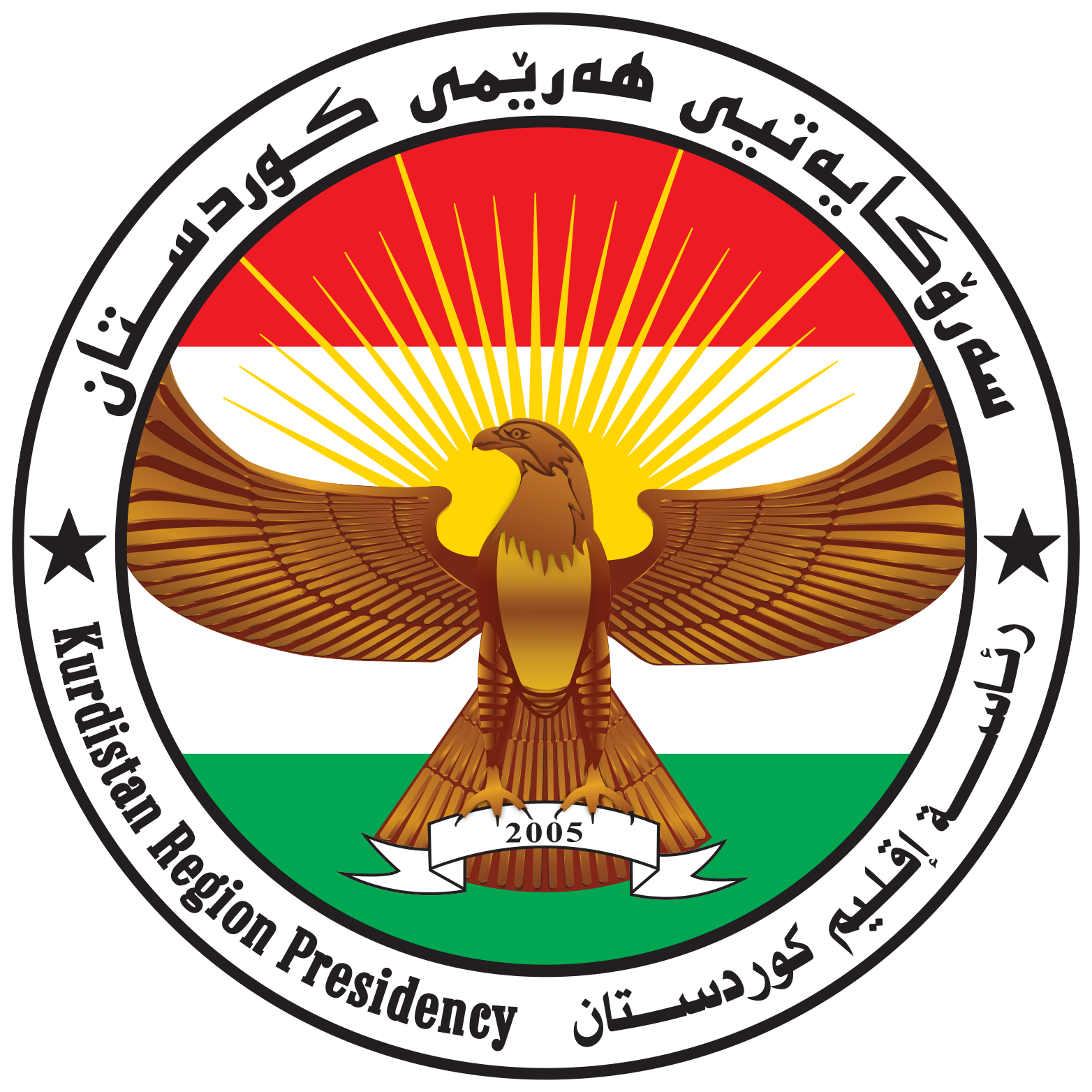

 پەرلەمانی کوردستان
پەرلەمانی کوردستان
